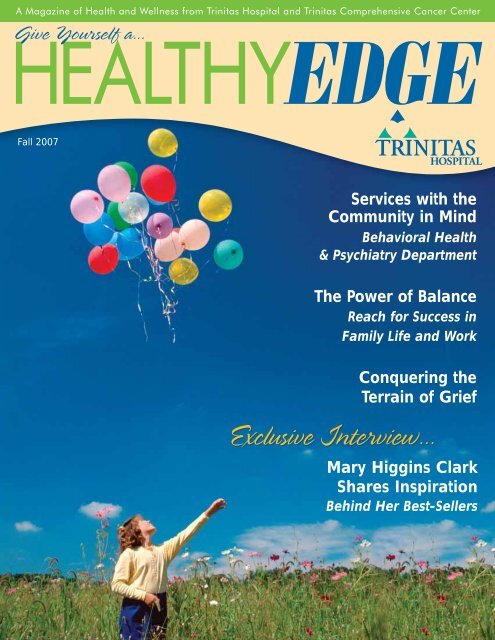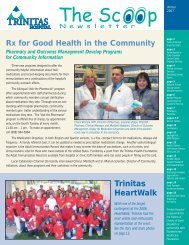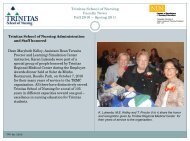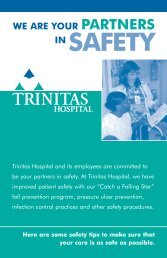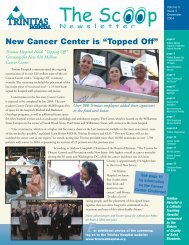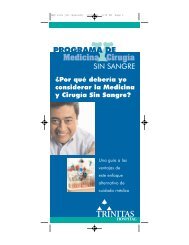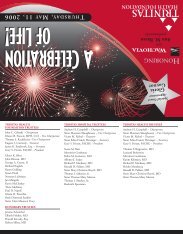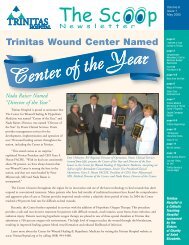Exclusive Interview⦠- Trinitas Hospital
Exclusive Interview⦠- Trinitas Hospital
Exclusive Interview⦠- Trinitas Hospital
- No tags were found...
You also want an ePaper? Increase the reach of your titles
YUMPU automatically turns print PDFs into web optimized ePapers that Google loves.
Mary Higgins Clark at home with Warren and the kids in 1961.(From Kitchen Privileges: A Memoir by Mary Higgins Clark, Simon & Schuster, 2002)first bypass operation was done ayear later. How many lives has itsaved? Warren looked healthy. Hehad always been a terrific athlete.He turned 45 less than two monthsbefore he died. I was 36.Did heart disease run inhis family?MHC: His father had a stroke in his50s. Warren was a heavy smoker.You couldn’t get him off it. In theend, when we got that verdict fromthe doctor, he said, ‘Of course, nosmoking; it’s a nail in the coffin.’I gave up smoking, but Warrencouldn’t kick the habit. I told him,‘The prescription was not that I giveit up while you keep it up.’What advice would you giveto moms today who findthemselves widowed at ayoung age?MHC: Be grateful you have yourchildren. I wasn’t sure if I was pregnantwhen Warren died. I wasn’t, butI was secretly thinking I could handlesix as well as I could handle five.4 HEALTHYEDGEI remember running into a very niceman I knew in town who said, ‘You’rehandling Warren’s death very well.’I said, ‘Do I have a choice?’ Whenyou really look at it, you do not havea choice. You have to accept whatyou can’t change.You suffered through aninordinate number of lossesin your early life—first yourfather, both brothers, yourhusband, your in-laws—oneafter another. The deathof your husband and yourmother-in-law, both on thesame day, must have beendevastating.MHC: My mother-in-law loved herson so much. She knew how badWarren was and said, ‘I don’t want tosurvive him.’ She was sitting by his bed.He had one of those crushing heartattacks that you hear the pain. I wasdownstairs and heard his ‘Agh’ allthrough the house. I thought the oxygentank had exploded. I racedupstairs, and his mother was trying tohold the oxygen tube over his face. Istarted CPR. When she saw that he wasdead, she just said, ‘Oh Warren,’ andcollapsed and died. Really, they diedtogether. Her heart simply gave out.What a tragedy.MHC: Four months later, her secondson died. I thought God gave her abreak that she died before she wouldhave to see another of her sons die.She was a very good woman, a mostcharitable woman.During WWII, your olderbrother, Joseph, joined theNavy. I’m sure you and yourmother feared for his life incombat, but instead he diedduring basic training.MHC: It certainly was not somethingwe expected. He got spinal meningitisand had a fever of 104 and violentheadaches. They had him in sick bayfor a week before they took him tothe hospital. He was only 18.PETER J. MLYNARCZYK, M.D., F.A.C.S.Diplomate American Board of SurgeryFormer Medical Director of <strong>Trinitas</strong> Center forWound Healing & Hyperbaric MedicineGeneral Surgery - Vascular SurgeryWound Care Specialist240 WILLIAMSON STREET, SUITE 302, ELIZABETH, NJ 07202TEL: (908) 355-3600 FAX: (908) 355-9490
Your younger brother, John,lost his wife and child inquick succession and thendied an untimely death froma fall. How did you getthrough all that?MHC: There were so many at onetime that it just seemed as thoughthere was blow after blow after blow.Of course, you have a constantsadness. You can’t lay that on otherpeople. But a fact of life is that peopledie out of their time.In reading your memoir, Iwas intrigued by your mother.No matter what tragedybefell her, she forged ahead.MHC: I think the great grief of herlife was Joseph. The loss of my fatherwas, of course, devastating; butthere’s something about losing achild. He had been a ‘preemie,’ andMary Higgins Clark admits to writingher first children’s book, Ghost Ship(Simon & Schuster, 2007), “in anhour or less.”she never left his side during that firstyear; she was so afraid he would slipaway. She would have thrown herselfacross the tracks for any one of us,but there was something so tenderabout her relationship with Joseph.What attributes bestdescribe your mom?MHC: My mother never stayedangry, even if she had a reason tobe mad at someone. She alwayshad a sense of humor. Her heart wasbroken, but she was never gloomy.She never said ‘Why me’ to me ormy brothers. When you have faith,if someone is sick, you can stormheaven with prayers. And you takecomfort that there has to be a reasonfor all this; there must be a biggerplan that you don’t know about.Was your mom’s resiliencefollowing the sudden death ofyour father a model for youwhen your husband died?MHC: Since I knew how much Imissed my own father, I knew exactlyhow much my kids would misstheirs. I thought it was my job to bea mother who didn’t take the griefout on them, but also to do the best Icould because I knew how much theywould miss him.Continued on page 6Jersey Rules!Jokes about New Jersey are nolaughing matter for Mary HigginsClark. In an effort to shine apositive light on the Garden State,she intentionally set six of herbest-selling suspense novels inher adopted home state.They are—I Heard that Song Before 2007.No Place Like Home 2005.The Second Time Around 2003.On the Street Where You Live2001.All Around the Town 1992.The Cradle Will Fall 1980.(Clark’s books are all published inhardcover by Simon & Schusterand, subsequently, in paperbackby Pocket Books.) — J.T.FALL 2007 5
FireplacesStovesMarbleFree EstimatesWe Provide Full Service From:Design & LayoutFraming & StoneworkMarbleGas • PropaneWood • ElectricWe Carry a Full Line ofWood, Stone andMarble Mantles10% Discount forthe Medical ProfessionVisit our tremendous showroomwith over 40 burning displays732-727-FIRE7050 Route 35 North,South Amboy, NJ 088792129 Richmond Terrace,Staten Island, NY 10302718-815-9350 6 HEALTHYEDGEMary Higgins Clark and John Conheeney dancing at their wedding in 1996.(From Kitchen Privileges: A Memoir by Mary Higgins Clark, Simon & Schuster)Continued from page 5In the 1950s and 1960s, mostmothers didn’t work or havethe kind of goals and drivethat you had. Your husbanddidn’t seem to be threatenedby your determination towrite. He sounds like aprince!MHC: He loved it. Warren’s attitudeabout it was, ‘Look, so many peopletry and don’t make it. Go ahead, butthink of it as a hobby. Some womenbowl, you write.’ When my workstarted selling, no one was prouderthan he.Throughout your career,you’ve given generously ofyour time to various Catholiccauses and to literacy. Whyliteracy?MHC: I’ve always been active in theliteracy program in New York andhave done a lot with former First LadyBarbara Bush. I think the biggest giftyou can give someone is education,and there’s nothing more basic ineducation than to be able to read.You were a Bronx girl, yetyou’ve lived much of youradult life in New Jersey.How have your hometownsimpacted your work?MHC: All my life I have had todefend the two places that I havelived all my life, the Bronx and NewJersey. This is why I’ve written sixbooks specifically set in New Jersey,to try to get people to appreciate ourstate.
Despite all of the responsibilitiesyou’ve shouldered asa single mother of five,you’ve never lost sight ofyour personal goals. Youwanted to write, to travel toexotic places, to wear thosegowns you admired in shopwindows along Fifth Avenue.You were also determinedto graduate from college.How old were you whenyou got your degree?MHC: I was 48. I gave myself aprom. It was a darn good party!How do you manage tomaintain your energy level,especially on gruellingbook tours?MHC: Travelling has gotten soobnoxious now with the security andgetting there early. There are so manydelays. That has made going out ontour less attractive.But it’s really a pleasure when youmeet people who say they’ve readevery one of your books, or who sayhow they were able to escape whilereading one of them at a time whenthey were either sick or had terriblegrief. I’ve had four generations standin front of me—13, 35, 57 and 75—and great grandma says, ‘We allread your books, dear!’You always look fabulous.Do you work-out?MHC: I’ve started with a trainerwhen I’m home because two yearsago I broke my leg—if you canbelieve it—on a banana. I slipped inthe kitchen on a tiny slice of bananathat had fallen on the floor. I’mpushing 80 but I’m not hiding it. I’drather look good at 80, than hearsomeone say, ‘Doesn’t she look awfulat 68’!In retrospect, what standsout most in your life beyondthe losses we’ve discussedand the great successyou’ve achieved throughyour writing?MHC: I’ve been very blessed. I’vebeen married for almost 11 years toJohn Conheeney. So, God gave me agood man at the beginning and agood one at the end! After Warren’sdeath, I knew I was going to educatemy children, that I would neverdepend on a man to do it, rich orpoor. I worked hard to make it happen.I wanted them educated, and Iwanted them to do well.Some women have beenknown to choose a manover their kids.MHC: Following Warren’s death,I just thought I would not getinvolved. Suppose I married aguy with a lot of money who said,‘I want you to bake cookies, andI like four of your kids and I don’tlike the fifth.’ I made a deal withGod: ‘Don’t take the kids and, Ipromise you, I will never ever beone of those ladies who’s sleepingaround, promise.’ Better the pictureon the wall of a father who lovedthem, than somebody who mightfind one or the other a pain inthe neck.What life lessons would youmost like to pass on to yourchildren and grandchildren?MHC: Be aware of how blessed youare. Look around at the educationyou’ve had, at the home you have,the friends you have, and the healthyou enjoy. Be grateful to God for allof it because so many people havenothing and some less than nothing.If we don’t all wake up and lookaround and be grateful for what wehave, it’s pretty scary.Judith Trojan is an award-winning entertainmentjournalist and the director of TheChristopher Awards, currently in its 59thyear of honoring films, TV/cable programmingand books that “affirm the highestvalues of the human spirit.”N E W J E R S E Y ’ S L E G E N D A R Y J E W E L E RFords Jewelers“Your Official Rolex Jeweler”One of New Jersey’s Largest Quality Watch JewelersOver 40 Name Brands • Certified Rolex Watchmaker On PremisesG.I.A. Graduate Gemologists on StaffThe Largest Selection of Fine Watches in New JerseyBarry BermanGraduate, Diamond Masters of AmericaComplete Fine Collectible Gift Dept. - Lladro, Swarovski, Hummel, Lenox Classics,Disney Classics, Armani, Lalique, Waterford, Franklin Mint449 New Brunswick Ave., FORDS | www.fordsjewelers.com | 732-738-7322Albert W. Dahl, MGR, G.I.A. Graduate Gemologist • A.G.S. Certified GemologistOpen Daily 9:30 AM - 5:00 PM • Thursday 9:30 AM - 8:00 PM • Closed Sun. & MonFALL 2007 7
Services with the Community in MindBehavioral Health & Psychiatry by Kathryn SalamoneIs your spouse feeling worthless as aresult of “downsizing” at the job? Are youraging parents losing interest in life? Haveyour teenage children begun to exhibitchanges in their behavior, their eatinghabits or their friends? Is your youngestchild having problems adjusting to preschool?Is the daughter of a friend strugglingwith substance abuse problems? Hasa nephew thought of suicide? Is your familybuckling under the strain of caring fora developmentally-disabled relative?If you’ve answered “yes” to any of thesequestions, you need look no further thanthe Department of Behavioral Health &Psychiatry at <strong>Trinitas</strong> <strong>Hospital</strong>.Recognized as one of the most comprehensivedepartments of Behavioral Healthand Psychiatry in the state, <strong>Trinitas</strong><strong>Hospital</strong> is a premier facility offering specializedservices in a full continuum of carefor adults, children, adolescents and theirfamilies. The needs of special populations,such as those with various addictions, arealso part of the services that set <strong>Trinitas</strong><strong>Hospital</strong> apart.In the past several decades, advances indrug treatments that improve care as wellas other types of therapies now offer amore supportive atmosphere to patientsand their families. <strong>Trinitas</strong> <strong>Hospital</strong>’sDepartment of Behavioral Health andPsychiatry stays current in the most effectivetreatment practices available.James Lape, Vice President, BehavioralHealth & Psychiatry, confers withMarylse Benson, Director of BehavioralHealth Services, on the New Point campusof <strong>Trinitas</strong> <strong>Hospital</strong> where thedepartment is located.“We are dedicated to providing relevantand effective behavioral health servicesin the least restrictive, most communityorientedmanner possible, by creating programsthat are responsive to the needs ofour community and representing a finetunedcontinuum of care,” notes JamesLape, Vice President, Behavioral Healthand Psychiatry. “This means that weattempt to treat people and their mentalhealth issues in both the hospital settingand directly in the community.”Taking Tots by the HandFrom their first years, children setoff on a life-long course of development.However, sometimes there can be developmental“stumbles” that can signal problems.Highly-qualified medical residents lend their talents and abilities to the BehavioralHealth & Psychiatry Department. Shown at left are Anwar Ghali, MD, Chairman, andJames Lape, Vice President, Behavioral Health & Psychiatry. At right are PurabiBharatiya, MD, Medical Director, Inpatient Psychiatric Unit, and Gary S. Horan,FACHE, President & CEO. In the center are: Michael Zajfert, MD, Michael JamesCunningham, MD, Suma Srishaila, MD, and Yahaira Espada, MD.Perhaps it is displays of temper, separationanxiety, or an inability to become partof the social framework of the classroom.The Therapeutic Nursery at <strong>Trinitas</strong><strong>Hospital</strong> helps pre-school children three tofive years old and their families get oncourse. For this age group, positive behaviormanagement and socialization in theschool setting are the primary goals.“We bring professional expertisetogether to work effectively with parentsand teachers to develop treatment plans for8 HEALTHYEDGE
Members of the TherapeuticNursery include in the foregroundAdriana Gonzalez, RNand Lilia Cristina Pineros,clinician, and in the rear,Dinorah Frontera, PsyD,Program Director, andMichelle Gibbs,family specialist.NEWS ONTHE STREET…ABOUT BEHAVIORALHEALTH & PSYCHIATRYAT TRINITAS HOSPITAL“When I sent a student in crisis, yougave immediate help, and it had apositive effect!”– Teachereach individual child through play therapyand family therapy sessions,” explainsDinorah Frontera, PsyD, Director of theTherapeutic Nursery. Parent groups worktogether with mental health professionalsto learn how to manage their child’sbehavior, how to encourage the socialemotionaldevelopment of their child, andhow to work cooperatively with schools.In short, these sessions offer parents tipsand techniques they can use every day in aconfidential and supportive setting.“We want children and their familiesto move forward with confidence,” saysDr. Frontera.For children 5 – 17 years of age, comprehensiveservices such as a partial hospitalday treatment program, an after schoolprogram and an outpatient program providinggroup, individual, and family therapyare also available. Behavioral issuessuch as ADHD (Attention DeficitHyperactivty Disorder), child depression,anger management and social difficultiesare addressed and treated.To help stabilize children in thehome/community environment, theChildren’s Mobile Response andStabilization System is a vital source oftreatment and care. If further communityintervention is needed, the Child andFamily Crisis Clinician works to preventunnecessary hospital emergency room visitsfor children by determining the mostappropriate services. “Schools can contactme when there is a concern a child may beContinued on page 11CARDIOVASCULAR DISEASES240 Williamson Street • Elizabeth, NJ 07207908-994-5300 • Fax 908-994-5308ARTHUR E. MILLMAN, MD FACC/FSCAIASSOCIATE PROFESSOR OF MECICINESETON HALL UNIVERSITYGRADUATE SCHOOL OF MEDICAL EDUCATION“I’m so thankful our students have aSchool Based program in the buildingto be able to reach out and touchthem immediately during a crisis situation.Keep up the good work!”– Teacher“I found in this group an area where Ican express my opinions and not bepenalized for it.”– Student“It helped my child from falling victimto peer pressure.”– Parent (about school based services)“I can’t thank you enough for yourhelp and support when my son washospitalized at <strong>Trinitas</strong>. As you canimagine, having to leave and be awayfrom your child is not easy, but yourhelp made it better.”– Parent“Our residents have benefited greatlyfrom the services of your geropsychiatricprogram.”– Senior Housing staff“All the staff are helpful and try toaccommodate the patient.”– Community Agency“I have a dream that my life will be agreat one. I would like to thank everybodywho has helped me and showedme respect.”– PatientFALL 2007 9
CREATING PARTNERSHIPS FOR UNDERSTANDING AND SUPPORTThe Department of Behavioral Health& Psychiatry also performs a valuableservice in continuing education andsupport. Each year, the departmentconducts a wide variety of seminarsdesigned to bring expert speakersand researchers to share their insightswith members of the department aswell as outside mental health professionalsand those in community agencieswho serve those with behavioralproblems.Partnerships with the United Way offeron-site training and consultation atpre-schools and day care centers inUnion County. Early childhood professionalslearn behavior managementtechniques and gain insight intoidentifying worsening symptoms thatmay require further treatment.Data shows that children set hundredsof potentially deadly fires each yearin New Jersey. To provide educationand to heighten awareness of thisproblem, the Department ofBehavioral Health & Psychiatry hosteda workshop in conjunction with theUnion County Children’s Inter-AgencyCoordinatingCouncil. Theseminar includedtopics such asfire settingtrends, risk factors,assessmenttechniques andtreatment optionsavailable in thecounty.Monthly GrandRound Sessionsdraw a multi-disciplinaryaudiencewho benefit fromthe knowledgeand expertise ofprofessionalswell-versed ondiverse topics. From discussions onthe impact of aging on the family tomore complex research-oriented programsabout opioid (pain-killer)dependence among adolescents, anddual diagnosis of developmental disabilityand mental illness, theDepartment of Behavioral Health &Psychiatry is a valuable resource ofinformation for thelayman as well asthe mental healthpractitioner.Lisa Marsch, PhD, Senior Principal Investigator in the Centerfor Drug Use and HIV Research and authority on opioiddependency, exchanged observations about the epidemic ofpain killer abuse among adolecents with Brian Boyle, MS,Clinical Coordinator, and Romulo Aromin, MD, Chief of theAdolescent Substance Abuse Program, following her recentseminar presentation.Support Organization of UnionCounty, weekly support groups arealso held for parents and caregiversof children with behavioral healthneeds.Partnerships with the Union CountyProsecutor’s Office enable staff at<strong>Trinitas</strong> to support more effectivelythose who are victims and perpetratorsof domestic violence.Photographed at a professional program that exploredHuman Trafficking were Theodore J. Romankow, Prosecutorof Union County, James Lape, Vice President, BehavioralHealth & Psychiatry, Terrence Coonan, Executive Director,Florida State University, Center for the Advancement ofHuman Rights.10 HEALTHYEDGE<strong>Trinitas</strong> <strong>Hospital</strong>demonstrates sensitivityto the family byhosting supportgroups, includingmonthly NationalAlliance for theMentally Ill (NAMI)support groups heldon site as well asperiodic 12-weekfamily educationclasses. In conjunctionwith the FamilyDinorah Frontera, Psy.D, providesinsights into behavioral health of preschoolersin a well-attended seminar forchild care professionals.
Nancy Mooney, MA, LPCexperiencing mental health issues, such asdepression and anxiety,” explains NancyMooney, MA, LPC. These services can furtherhelp children who struggle with angermanagement or need help coping withtheir feelings, may have expressed suicidalor homicidal tendencies, or have engagedin self-harm.Pro-Active ProgramMakes a Difference“Because students spend a significantportion of their lives in school, <strong>Trinitas</strong><strong>Hospital</strong> is committed to working collaborativelywith local Boards of Educationto provide services which respond to thebroad range of issues that students facetoday,” notes Marlyse Benson, Director ofBehavioral Health Services. In order tosupport students dealing with problemssuch as substance abuse, teen pregnanciesand teen suicide, <strong>Trinitas</strong> <strong>Hospital</strong> managesan innovative behavioral and mentalhealth program that brings help directlyinto local schools. The New JerseyDepartment of Children and Familiescurrently funds two such programs inElizabeth and Roselle.The staff at the Elizabeth High SchoolYouth Enrichment Services (YES) programreports the energy and vitality of the programcome from the students themselves.“With input from the teenagers, the programis customized to respond to identifiedneeds,” says Brian Nandy, MA,Program Director at Elizabeth HighSchool-Jefferson House. The programreaches students before and after schooland throughout the summer. “Thanks tostudent feedback, the program continuesto evolve and grow to suit their needs,”notes Jeannette Dejesus, LCSW, ProgramDirector at Elizabeth High School –Halsey House,“These programs are designed to helpstudents finish high school and graduatesuccessfully, strengthen peer relationshipsand family relationships, and develop acareer plan for their future, “ explainsAlexandra Pintauro, MA, Director of theYES program in Roselle. “In essence, ourgoal is to help students overcome barriersthat may be interfering with the process ofhealthy living.”Professional staff members, includinglicensed counselors, Master’s level clinicians,and other essential support staff areon site and provide individual/family/group therapy, career and educationaldevelopment, learning support, pregnancysupport, pregnancy/STD prevention, communitylinkages, and recreation.“Schoolwork poses more demands onstudents to achieve academic success thanever before,” observes Roger Goddard,Director of Wellness ManagementServices, who continues, “Add financialpressures, family difficulties, hyperactivitylevels and emotional problems to the mixand success in school can be more difficultfor children today.” Wellness ManagementServices has offered local schools a StudentLeadership and Success Program thatFUN FOR EVERYONE!!!Mount Hyatt Miniature Golf18-Hole CourseBirthday Party Packages AvailableContinued on page 12Psychiatrists, psychologists, social workers, nurses, creative arts therapists, substanceabuse counselors, and mental health workers — many of whom hold advanceddegrees — are members of the Behavioral Health & Psychiatry Department staff.Shown seated are Shirley Ostrega, social worker, and Kathleen Tumino, RN.Standing from left are Maria Davanzo, art therapist; Christine Donnelly, substanceabuse counselor; Jose Hernandez, mental health worker; Jaya Gavini, psychiatrist,and Essie Larson, psychologist.732-669-9100www.hyatthills.com• Challenging, Well-Maintained Nine Hole Golf Course (Par 36)• Driving Range (50 Stations)• Practice Bunker, Chipping & Putting Greens• Golf School, Private or Group Lessons• Well Stocked Pro Shop• Club Repairs & FittingsOpen Daily 7AM to 10PMPublic Welcome1300 Raritan Road (Clark/Cranford Borders)FALL 2007 11
days a week and is designed to providetreatment for those patients who need consideratelymore than is typically availablein an outpatient setting, but who do notrequire the supervision of an inpatient setting,group therapy and traditional individualclinic services. Multidisciplinarystaff members interact with patients tohelp them manage medications and alsoprovide psychotherapy for individuals,couples, and families.At the inauguration of the YES program at Abraham Clark High School in Roselle,Marlyse Benson, Director of Behavioral Health Services (at left holding bow), noted thatthe program offers comprehensive services in a supportive and confidential environmentthat enhances the academic, emotional and social lives of the students. JamesLape, Vice President, Behavioral Health & Psychiatry, is shown in the rear at right.encourges motivation and success skills.Students learn life skills that help themcommunicate effectively, manage theirtime more efficiently, and gain confidence.For parents who may be experiencingproblems with their adolescent and substanceabuse, school-based clinicians canrefer them to the Adolescent SubstanceAbuse program, also housed at <strong>Trinitas</strong>.The program helps address specific issuesrelated to mental health and substanceabuse and enables adolescents to receivesupport, preventing hospitalization by stabilizingbehaviors and improving copingskills to maintain sobriety.Meanwhile…On the Front Lines<strong>Trinitas</strong> Psychiatric Emergency Services(PES) is the Designated Screening Centerfor Eastern Union County. Staffed by apsychiatrist 24/7, the PES responds to crisissituations. A psychiatrist, nurse andmental health screener perform comprehensiveassessments and link patients toservices based on individual needs. Patientswelcome the response and care of the staffand have given the PES a customer satisfactionrate of 4.78 out of a possible 5.The Department’s Peer SupportProgram provides patients and their familieswith companionship and education.Associates explain the screening process tothe patient and provide follow-up contact.“Peer Associates make the processmuch less threatening to consumers,”notes Tony Trachta, LSW, Director of thePES. “They speak from their own experienceand help to convey a sense of camaraderie.Patients in turn develop a comfortlevel that helps them understand andaccept recommendations and treatment.”Treatment withinthe CommunityWhen community-based treatmentmakes sense, the Department of BehavioralHealth & Psychiatry works with the familyand community agencies to help the personwith mental illness to stay at home andfunction within their community. “Wedesign treatment plans to respond to lifeskills issues that, when coordinated effectively,can help patients achieve a bettersense of self and greater confidence in theirability to function from day to day.” notesLinda Reynolds, LCSW, Director of theAmbulatory Adult Psychiatry Services.A wide range of outpatient adult servicesis available. Among them are acutepartial hospitalization, which operates fiveSpecialized programming is availablefor specific populations including thoseinvolved in domestic violence, thoseaffected by HIV, and those needing griefcounseling. The Family Resource Centeris a satellite office located in Cranford andalso specializes in depression, anxiety andpsychological trauma.Sensitivity to SeniorsAt a time when older adults hadplanned to enjoy life, they often encounterunexpected stresses and problems. Someof these problems may include chronicphysical or emotional illness, coping withthe loss of one’s spouse or other closefamily members, and decreasing abilityto manage one’s daily life independently.Ali Pintauro, MABrian Nandy, MASpecialized treatment addresses theneeds of the elderly so that psychiatric andmedical considerations can be treatedjointly and safely. Staff members withgeriatric expertise and in-depth knowledgeof older adults work together with seniorsto help them return to their normal livesquickly and successfully. For those whorequire hospitalization, this specializedprogramming is available on the inpatientunit as well.Continued on page 1412 HEALTHYEDGE
BEHAVIORAL HEALTH & PSYCHIATRYThe Department’s inpatient services include beds for the treatment of adult, child/adolescent and mentally ill/developmentally-disabledpersons. In addition, patients can look to <strong>Trinitas</strong> <strong>Hospital</strong> for psychiatric emergency response/screening,outpatient services, partial hospital programs and addiction services. Psychiatrists, psychologists, social workers, nurses,creative arts therapists, substance abuse counselors, and mental health workers — many of whom hold advanced degrees— offer meaningful treatment and interaction with patients in a bi-lingual environment. Those suffering from anxiety andpanic, depression, suicidal ideation, schizophrenia and psychotic conditions, bipolar disorder and other mental healthproblems can avail themselves of both inpatient and outpatient services.Following is a list of programs and services for handy reference.All phone numbers are (908) Area Code, except where noted:Access/Referral 888-841-556424 Hour Crisis Hotline 351-6684Psychiatric Emergency Room 994-7131Adult Psychiatric Services:Inpatient 994-7250Outpatient 994-7556994-7557994-7558Acute Partial <strong>Hospital</strong> 994-7255Geropsychiatry 994-7336Kinship Connection 994-7460Developmental Disabilities 888-393-3007Adult Substance Abuse ServicesPartial <strong>Hospital</strong>, IntensiveOutpatient and Outpatient 994-7090Outpatient Medical Detox 994-7043Women’s Addiction 994-7120Gambling Program 994-7156Child/Adolescent Psychiatric ServicesInpatient/Subacute 994-7712Outpatient 994-7223Partial <strong>Hospital</strong> 994-7722After School Program 994-7722Adolescent SubstanceAbuse Program 994-7722Therapeutic Nursery 994-7082School Based Services:Elizabeth High School (YES) 994-5383436-6771Abraham Clark High School- Roselle 298-2040 ext. 2221Children’s Mobile Responseand Stabilization 877-652-7624HIV ServicesHIV Counseling &Testing Center 994-7300Early Intervention 994-7600Family Resource Center 276-2244300 North AvenueCranford, NJ 07016For additional information, please call the department ofBehavioral Health and Psychiatry at 908-994-7452 oremail Kelly Baker at KBaker@trinitas.org.Visit www.<strong>Trinitas</strong><strong>Hospital</strong>.org for more information.Located in Cranford near the GardenState Parkway and close to home, officeor school, the Family Resource Center isa community outpatient treatment centerthat offers services for children, adolescents,adults, couples, and families.FALL 2007 13
Alternatives toChemical DependencyAddiction services are available to adultsas well as adolescents. Director LindaChapman, MHS, RN, describes the <strong>Trinitas</strong><strong>Hospital</strong> Behavioral Health & PsychiatryDepartment’s Outpatient AddictionServices as one of the largest outpatient programsin the state. The program includesambulatory detoxification, partial hospitalization,and outpatient services. Uniqueservices are also available for gamblers.Professionals who specialize in unravelingthe complexities of mental health andaddictions play a key role in Women’sAddiction Services (WAS). WAS offers a fullcontinuum of services to help women andtheir families to begin their recovery process.”We believe that addiction affects allfamily members, that recovery is an individualresponsibility,” says Linda. The WASprogram provides a structured environmentin which multidisciplinary assessment andtreatments take the place of an inpatientstay. Medication management helps patientsimprove their level of function and alsoreduces the symptoms of drug abuse.Therapeutic responses help patients whomay experience a wide range of complications.Motivational counseling, family guidanceand support, and other resources helpto link patients to community services andresources. Collaborative relationships areongoing with the Division of Youth andFamily Services, Union County Drug Courtand surrounding community agencies.Project Sustain is a six-month residentialprogram funded by the Division ofAddiction Services that supports womenand their children in appropriate housingthrough the local YMCA in Elizabeth.During their stay, women and children areoffered a stable living experience and atherapeutic environment. Staff membersof the department encourage and assistwomen with planning family-friendly andcost-effective weekend activitiesWeekly AA and Al-Anon meetings areheld on site at <strong>Trinitas</strong> <strong>Hospital</strong> as well,and provide additional support for individualsand families.Services for SpecialNeeds PopulationsMany of those who use the services ofthe Department of Behavioral Health andPsychiatry are individuals and familieswhose circumstances are extremely difficultdue to developmental disabilities. For thedevelopmentally disabled, <strong>Trinitas</strong><strong>Hospital</strong>’s Statewide Clinical Consultationand Training (SCCAT) program offers keyservices to those over the age of 18, includingassessments, linkage to mental healthand behavioral services in the communityand crisis mobile response.Developmentally-disabled individualsliving within their communities in all 21New Jersey counties are eligible for thisservice. An Integrated Service DeliveryTeam can assist with case managementbased on referrals it receives from Essex,Union and Somerset counties as well asHunterdon, Mercer, Monmouth,Middlesex and Ocean counties.SCCAT works very closely with the<strong>Trinitas</strong> inpatient staff. When hospitalizationfor this population is necessary,SCCAT facilitates admission to the DualDiagnosis Mentally Ill/DevelopmentallyDisabled Psychiatric Inpatient unit. This10-bed Acute Unit is designed to meet thespecial needs of this population by preventinglong-term institutionalization andalso maintaining community placement byproviding short-term acute psychiatricinpatient services. For children and adolescentswho are dually diagnosed, thechild inpatient unit also offers servicesgeared toward servicing these needs.ANWAR Y. GHALI, MDEgyptian born and educated inhis native country, Anwar Y.Ghali, MD, received his medicaldegree in 1966. Dr. Ghaliobtained his earliest experiencein Cairo, Egypt, and SaudiArabia where he served as astaff psychiatrist and a Chief of Psychiatry. He later servedon the medical staff of Woodilee <strong>Hospital</strong> in Glasgow,Scotland, before emigrating to the US. He is Board certifiedby the American Board of Psychiatry and Neurology.In the late 1970s, Dr. Ghali joined the staff of the Universityof Medicine and Dentistry of New Jersey where he laterbecame the director of Emergency Psychiatric Services.From UMDNJ in Newark, Dr. Ghali joined the staff ofElizabeth General Medical Center as the Chief of AmbulatoryPsychiatric Services in the late 1980s. During the nextdecade, Dr. Ghali served on the psychiatric staff of theVeterans Administration – New Jersey Health Care System.Since 2001, he has served as the Chairman of the BehavioralHealth and Psychiatry Department of <strong>Trinitas</strong> <strong>Hospital</strong>.Licensed in New Jersey, New York and California, Dr.Ghali is a Fellow of the American Psychiatric Association(APA). In addition to his membership in the APA and theAmerican Medical Association, Dr. Ghali is also a memberof the American Association of Psychiatric Administrators,the American College of Executive Physicians, and theAmerican Management Association. He is a past-presidentof the New Jersey Psychiatric Association.A frequent presenter at professional meetings, during thepast three decades Dr. Ghali has also authored scholarlyarticles published in national and international journals.14 HEALTHYEDGE
New “Hybrid” Procedure at <strong>Trinitas</strong>by Doug HarrisCOMBINES BEST TREATMENTSFOR DISC DISEASE by Doug HarrisPhysicians at <strong>Trinitas</strong> <strong>Hospital</strong> haveperformed one of the first “hybrid” spinalprocedures in the region, providing realrelief for individuals suffering from severeback pain due to degenerative disc disease.Just as hybrid cars combine the best inelectric and gasoline technology, the procedureat <strong>Trinitas</strong> combines two proven medicaltreatments – spinal fusion with an artificialdisc.Age, disease or injury can cause thediscs in the spine to break down, reducingtheir ability to help the body move andserve as natural shock absorbers. The resultof degenerative disc disease is often severepain and immobility, especially when morethan one disc is affected.That’s where the “hybrid” comes in.“Before this procedure became available, wewould normally fuse the discs where therewas disease. The body can compensatesomewhat when one disc is fused, howeverwith two fused discs the patient wouldexperience a definite loss of trunk and lowback motion,” explains Ralph Sweeney, Jr.,MD, the orthopedic surgeon who performedthe ground-breaking surgery. Spinalfusion is a technique that uses bone graft tofuse or join adjacent vertebrae together.Spinal fusion is a good treatment, butthere is a concern that the adjacent discs candegenerate more quickly when a diseaseddisc is fused, according to Dr. Sweeney.“The new ‘hybrid’ procedure involvesfusing only one section of vertebrae to createa solid base. Then, we insert an artificialdisc, which allows the patient to retainsome movement in the spine,” he continues.Gravity and the body’s muscles keepthe disc centered and aligned with the restof the spine.Since the artificial disc is relatively large,the surgery must be done through the frontof thebody.This“frontalapproach” involves aspecial challenge, and calls upon the skills ofa surgeon who can carefullymove vital organs and blood vesselsto expose the spine.“You definitely have toknow your anatomy!” assertssurgeon Peter Mlynarczyk, MD,who performed the hybridprocedure with Dr. Sweeney.“During this surgery we movethe aorta and vena cava out ofthe way, which is something wemust do very carefully. Onesmall tear and you can loseblood quickly,” he adds. A pioneerin this type of surgery, Dr. Mlynarczykfirst performed the “frontal approach” in1984. “Back then, we would come in fromthe front to remove diseased discs and putin blocks of bone to stabilize the spine,”he explained. “You absolutely have to treatthe veins with great care with this surgery,”he says.Frontal approach surgery involves“truly looking at anatomy in a differentway,” Dr. Mlynarczyk observes.There are additional benefits to performingthis surgery from the front. “Bycoming in from the front of the body youcan maintain the natural curve of thespine. This results in less adjacent disc diseaselater on,” Dr. Sweeney explained.During the five-hour procedure, thetwo physicians team up to place the artificialdisc in the exact center of the spine.“Fluoroscopic imaging is critical to viewingthe anatomical markers that tell methat I’m in just the right place. You need avery good radiologic technician, and Imust say that the personnel at <strong>Trinitas</strong> areexcellent. It requires a lot of teamwork,”Dr. Sweeney notes.During the surgery, Dr. Sweeney relieson feed-back from neuromonitoringdevices placed on the legs. “This assuresme that I’m not overstressing the nerves,”Ralph E. Sweeney, Jr., MD (left) and Peter J.Mlynarczyk, MD discuss placement of the artificial disc.Once the exact location is found, thesurgeons cut three channels into the bone.The teeth of the artificial disc fits thesechannels and then “press fits” into thebone. Over time, bone grows into themetal surrounding the disc, but not intothe disc itself.The hybrid procedure performed at<strong>Trinitas</strong> was on the L-4 and L-5 vertabrae,which are near the waistline. This firstpatient was a 24-year old who was injuredin an auto accident. “Although youth is onhis side, he also smokes - and we knowthat smokers have three times as many discdegenerations than non-smokers. Still, hisprognosis is very good,” Dr. Sweeney says.Patients usually do not require a transfusionduring the hybrid procedure.“Patients pre-donate blood prior to thesurgery, and during surgery we employ thecell-saver that virtually eliminates the needfor blood. This is all part of <strong>Trinitas</strong><strong>Hospital</strong>’s Bloodless Medicine and SurgeryProgram,” he explains.Following a 4-day hospital stay,patients typically undergo approximatelyfour months of physical therapy.Dr. Sweeney studied the hybrid procedurein San Francisco and Dallas, where hespent time with pioneering spine surgeonsDavid Selby, MD and Arthur White, MD.FALL 2007 15
“Mommy Makeovers” On The Riseby Joseph D. Alkon, MDBoard Certified, American Board of Plastic SurgeryChief, Division of Plastic Surgery, <strong>Trinitas</strong> <strong>Hospital</strong>After spending years power-walking,dieting, and exercising regularly with atrainer at the gym, Lisa – a mother of three- all but lost hope of ever regaining the prepregnancyfigure she tirelessly worked torecapture. Angie, a mother of two, wishedshe could again wear the fitted clothes sheused to wear before children and again feelcomfortable about her physique.Despite their scales showing lost pregnancyweight and their mirrors showingfirmer toned arms after an exercise routine,they both still sighed with disappointmentat the appearance of their waist-lines,breasts and hips. “My stomach botheredme in the way it looked, always hangingover my pants despite all my hard work,”Angie explained. “The loose skin andstretch marks of my lower belly and lovehandles was something I just couldn’t everimprove upon,” adds Lisa.Lisa and Angie are certainly not alonewhen it comes to their bodily sentiment.“Mommy Makeovers,” the plastic surgeryprocedures that are tailored to women whohave completed having children yet desirea return to their pre-motherhood figure, isa rapidly growing request that is outpacingmost other areas of plastic surgery.Commonly, these Mommy Makeoverprocedures include tummy-tucks, liposuction,and multiple different types of breastsurgery – from lifts to augmentations orreductions. According to statistics compiledby the American Society of PlasticSurgeons, the largest organization ofboard-certified plastic surgeons in theworld, tummy-tucks alone in the “30-something” age category are up 12% in2006 as compared to 2005, while all cosmeticplastic surgery procedures are uponly 2% during that same period. Withcountless media reports, magazine articlesand television shows depicting plastic surgery,the topic and reality of someoneundergoing plastic surgery is no longerconsidered to be something attainable solelyby those of celebrity-status.After thinking about it for years, Lisastarted to research board-certified plasticsurgeons that offered the procedures shewanted. “My husband and I decided wewere done having children, and it wassomething I started to look into,” sheexplains. “My children were getting olderand I felt the time was right,” adds Angie.They each knew someone who already hada similar procedure and they were able tolearn from those personal experiences.But, it took another two years for Lisato ultimately have her surgery. “I literallyleft crying after my first consultation. Atthat time, I felt like I had to see the plasticsurgeon with the plushest office or consultwith someone I might have seen on a daytimetalk show. But, their quoted priceswere beyond what my husband and Icould afford.”After having been referred by a priorpatient and a close friend, Angie was convincedto have her surgery performed at<strong>Trinitas</strong> <strong>Hospital</strong>. It was “the honesty ofwhat the surgery would entail, what thepost-operative period would feel like, andthe lack of sugar-coating” she recalls.Similarly, Lisa was “so surprised andhappy” with how affordable it could be,being quoted a price less than half the priceJoseph Alkon, MDshe was quoted elsewhere two years before.“I just thought in my mind for all thattime it was something I could never dobecause we just couldn’t afford it with otherquotes having been literally twice the cost.”When asked about the nursing care,anesthesiologists, and overall experience,both women enthusiastically recalled theirplastic surgery experiences at <strong>Trinitas</strong>.“The quality of the bedside manner andcare by everyone far exceeded all of myexpectations,” notes Lisa. “Everyone wasfantastic. I have no complaints whatsoever,”says Angie. “I am 100% happy withmy results, and it’s beyond my expectations.”She adds, “I was up and runningwithin two and a half weeks, nothingchanged in my routine. I truly feel excellentabout myself and only wish I did ityears ago.”Lisa has the same advice for othersconsidering a Mommy Makeover.“I wish I had done it sooner,” she says. “Iam absolutely thrilled with my results. Iwish more people would realize that it isfeasible, affordable and attainable. Theydon’t have to be unhappy with somethingif they don’t want to be.” These twowomen are proof of that.*All names have been changed to maintain patient confidentiality16 HEALTHYEDGE
Physicians & SurgeonsHEALTHYEDGE is grateful to the following physicians and surgeons for theirsupport of our publication as a vital health information resource for our community.CARDIOLOGY/INTERVENTIONALPeter Lenchur, MD776 E. Third AvenueRoselle(908) 241-5545NEPHROLOGYGeorge V. Thalody, MD240 Williamson Street, Suite 400Elizabeth(908) 352-0560A New Smile…A New You!IMPLANTS &COSMETIC DENTISTRYPersonal encountersStart With a Smile…Sometimes NatureNeeds A Little HelpFAMILY/SPORTS MEDICINEStephen Parker, DO, FACSM331 Chestnut StreetRoselle Park(908) 245-9444INTERNAL MEDICINEUnion Square Medical Associates449 Elmora AvenueElizabeth(908) 282-6474NEPHROLOGYPremier Nephrology and Hypertension240 Williamson StreetElizabeth(908) 353-2064OB/GYNPreferred Women’s Health Care240 Williamson StreetElizabeth(908) 353-555OPTHAMOLOGYMichael H. Friedman, MD127 Chestnut StreetRoselle Park(908) 241-2800OTOLARYNGOLOGYRaimundo Obregon, MD1308 Morris AvenueUnion(908) 688-8855ORTHOPEDIC SURGERYNew Jersey Spine GroupRalph E. Sweeney, Jr., MD, FAAOS1122 South AvenueWestfield(908) 232-2700PEDIATRICSUnion County Pediatrics GroupAmita Patel, MD817 Rahway AvenueElizabeth(908) 353-5750Narendra Saraiya, MD817 Rahway AvenueElizabeth(908) 353-5750Raghunandan Sundaram, MD817 Rahway AvenueElizabeth(908) 353-5750THORACIC SURGERYPaul J. P. Bolanowski, MD219 South Broad StreetElizabeth(908) 352-8110A. Codoyannis, MD219 South Broad StreetElizabeth(908) 352-8110• Implant Placement/Resortation• Invisalign• Veneers• Periodontics - Orthodontics• Bonding• Crowns/Re-ConstructionAll Phases of General DentistryNitrous Oxide AnalgesicEMERGENCY SERVICE AVAILABLECenter ofDENTAL SERVICESDr. Richard J. LukendaDr. Richard L. SufficoolDr. Richard LukendaInsurance Claims ProcessedConvenient Financial ArrangementsFOR APPOINTMENT & CONSULTATION908-925-8110www.centerofdentalservices.comSe Habla EspañolMy Mowimy Po PoskuFala Se Portuguese924 NORTH WOOD AVE.LINDENHours: Monday - Saturday & EveningsFALL 2007 17
Community CalendarSeminars (Offered Free to Our Community)All seminars take place in the Physicians Conference Room,210 Williamson Street, Elizabeth, except where noted.To register for any seminar, call (908) 994-5138 or register onlineat www.<strong>Trinitas</strong><strong>Hospital</strong>.org.November 8, 200711:30 am – 1:00 pm“Sickle Cell Anemia”Vincent Salerno, MD, HematologistNovember 14, 20074:30 pm – 6:00 pm“Avoid the Holiday Spread”Luciele White,NPC Food Service ManagerLocation: Coffee ShopNovember 28, 200711:30 am – 1:00 pm“Caregiver’s Seminar”Gerardo Capo, MDDonna Filocamo, Manager,PsychoSocial Services,<strong>Trinitas</strong> Comprehensive Cancer CenterNovember 29, 200711:30 am – 1:00 pm“Diabetes: A General Overview”Sr. Mary Ann Mueller, RegisteredDietician and Certified Diabetes EducatorDecember 13, 200712:00 pm – 2:00 pmHealth ScreeningsNon-Invasive Cardiology, Laboratory &Physical Medicine StaffLimited to 50 registrantsTuesday, January 8, 200811:30 am – 1:00 pm“Discover Arthritis: Take Control”Peggy Lotkowictz, Vice PresidentMission Delivery Arthritis Foundation,New Jersey ChapterTuesday, February 5, 200811:30 am – 1:00 pm“Physical Activity & Arthritis:You Can Do It”Peggy Lotkowictz, Vice PresidentMission Delivery Arthritis Foundation,New Jersey ChapterProfessional Training OpportunitiesPrograms for healthcare providersand first responders.CPR; ACLS & PALS (AdvancedCardiovascular Life Support) &(Pediatric Advanced Life Support);Defibrillator Training; EMT BasicTraining and Renewals; PHTLS; IncidentCommand System; Advanced MedicalLife Support<strong>Trinitas</strong> <strong>Hospital</strong> Institute of Healthcare& Community Education425 Morris Avenue, Elizabeth, NJFor further information, call (908) 527-5222, ext. 12Special EventsMay 8, 2008<strong>Trinitas</strong> Health Foundation“Power of Healing” GalaThe Palace Somerset Park333 Davidson AvenueSomerset, NJ 088736:00 pm; $400 per personProceeds benefit the patientsat <strong>Trinitas</strong> <strong>Hospital</strong>.For reservations, call Laura Ciraco,(908) 994-8249 or lciraco@trinitas.org<strong>Trinitas</strong> <strong>Hospital</strong>AuxiliaryThe community is invited to joinin the following activities:December 5, 2007Wednesday Matinee“Curtains”See 2007 Tony Award-winning BestActor in a Musical, David Hyde Pierce,in the musical hit, “Curtains.” Fullpackage for the day, includes matineeticket and lunch at TRATTORIA DopoTEATRO. Round trip bus transportationfrom Westminster PresbyterianChurch, Corner of Westminster Avenueand North Avenue, Elizabeth, at 10:15A.M. $165 per person.Thursday, December 13, 2007“City Lights Tour”Join us as we enjoy MidtownManhattan at the height of the holidayseason. Round trip bus transportationfrom 225 Williamson Street in Elizabeth.For more information about the costfor this event, call (908) 994-8988.For more information about theseevents that benefit <strong>Trinitas</strong> <strong>Hospital</strong>,call the Auxiliary at (908) 994-8988.18 HEALTHYEDGE
All speakers, dates, times and locations were current as of press time. Readers are encouraged to call in advance if they wishto confirm any information published here about seminars, special events, classes, support groups or special programs.Support Groups (Offered Free to Our Community)Alzheimer’s Support GroupNovember 7, December 5, January 2Family Resource Center300 North Avenue, Cranford, NJ7:00 pm – 8:30 pmFirst Wednesday of every monthOpen to anyone caring for a personwho suffers from Alzheimer Disease(908) 994-7313Breast Cancer Support GroupNovember 19, December 17,January 21Conference Room A<strong>Trinitas</strong> Comprehensive Cancer Center<strong>Trinitas</strong> <strong>Hospital</strong>225 Williamson Street, Elizabeth, NJ11:00 am – 12:30 pmMeets third Monday of every month.Open to patients, families, friendsand loved ones. Please RSVP inEnglish to Donna Filocamo, LCSW,at (908) 994-8730; in Spanish toGriselda Hildago, (908) 994-8535.Breast Feeding Support GroupFirday mornings10:00 am - 11:30 amWIC Office65 Jefferson Avenue, Elizabeth, NJCall (908) 994-5142 to register.ClassesChild Birth/Breast Feeding ClassesNovember 12 - December 17(Mondays)<strong>Trinitas</strong> <strong>Hospital</strong>225 Williamson Street, Elizabeth, NJCall Christine Guarnera at (908) 994-54106 week classes for $60Cardiac Support Group(Open to cardiac patients only)January 177:00 – 8:00 pmPhysicians Conference Room210 Williamson Street, Elizabeth, NJCall Ann Marie Scanlon, RN, to register.(908) 994-5082Coping With CancerSupport GroupNovember 13, December 11,January 8Conference Room A<strong>Trinitas</strong> Comprehensive Cancer Center<strong>Trinitas</strong> <strong>Hospital</strong>225 Williamson Street, Elizabeth, NJ2:00 pm – 4:00 pmMeets second Tuesday of every monthSpeakers address cancer-related topics.Sleep Disorders Support GroupJanuary 307:00 pm – 9:00 pmPhysicians Conference Room210 Williamson Street, Elizabeth, NJCall (908) 994-8694 to register.Check outwww.<strong>Trinitas</strong><strong>Hospital</strong>.orgfor more information…Special Programs(Offered Free to Our Community)Look Good, Feel BetterDecember 11Thanks to a partnership of the AmericanCancer Society (ACS), the NationalCosmetology Association, and theCosmetic, Toiletry & FragranceAssociation (CTFA) Foundation, <strong>Trinitas</strong>offers patients at its ComprehensiveCancer Center personal beauty tips andtechniques that they can use everyday.210 Williamson Street, Elizabeth, NJPhysicians Conference RoomCall (908) 994-8244 to register.Made For Me BoutiqueNovember 1, December 6Appointments only.Call Amparo Aguirre at (908) 994-8244Managing Your Medications:“Ask the Pharmacist”November 27, January 22,February 2611:30 am - 1:00 pmOffered the fourth Tuesday of every month.Free of charge, by appointment only.Call (908) 994-5984.Medication Assistance ProgramIf you need help paying for prescriptions,you may be eligible for freemedication assistance.Call (908) 994-5423. Appointmenthours and locations:10:00 am – 12 noon, TuesdaysAdministrative Services Building,210 Williamson St., Elizabeth, NJ10:00 am – 12 noon, WednesdaysNew Point Campus,655 E. Jersey St., Elizabeth, NJBreast Feeding ClassesEvery Monday1:30 pm - 2:30 pmWIC Office65 Jefferson Street, Elizabeth, NJBreast Feeding Hotline: 800-994-5142FALL 2007 19
The Power of Balanceby Rena Kotik-SandbergDoes this schedule sound familiar? If you’re constantly on the go andperpetually in a hurry, you lack the time to truly enjoy the little things inlife. If you feel as though you must work diligently every minute in everyhour of each day in order to achieve your desired standard of living, askyourself this question: when do you have the time to enjoy it? Instead ofaiming toward the “perfect” lifestyle, try setting your sights on a balancedlifestyle. If you’ve slaved to purchase a designer set of china, but never hadthe time to enjoy the china with friends and family, then perhaps your lifeis imbalanced.5:00 am Wake up and hitthe gym.6:00 am Shower and get dressed.6:15 Take Sparky for a walk.6:20 Feed Sparky, kiss husband goodmorning, and wake daughter.6:30 Wake up daughter again.6:35 Make breakfast and set table.6:45 Serve breakfast.7:15 Take daughter to school anddrive to work.8 am - 5 pm Work.5:45 pm Pick up daughter from soccerpractice.6:00 pm Cook dinner.7:00 pm Clean table and help daughterwith homework.9:30 pm Put daughter to bed.10:00 pm Do you know where yourchildren are?10:15 pm Pay bills, do laundry, check foremails.11:00 pm Watch News, collapse on couch.11:30 pm Kiss husband good night andget to sleep.Life can be short, so it’s vital that we enjoy life’ssimple pleasures by managing time wisely. Thereare several vital components to achieving harmonybetween work and personal life:Repeat for five days, every week for the next year.Support fromyour spouseComplimenting your spouse – and viceversa – and recognizing one another’sstrengths shows that mutual respect exists.When both partners show support andbelieve in one another, balancing careerand family practically becomes effortless.20 HEALTHYEDGEStay organizedand MultitaskLet’s face it, no one can remember theschedules of each person in the household– it can be difficult enough to memorizeyour own! Using a common calendar andposting it on the refrigerator avoids schedulingconflicts and alleviates stress for theentire family.Make the most of every minute wheneverpossible. For example, if you want todrop pounds but can’t live without yourlate morning soap opera, hop on the treadmillin front of the TV and immerse yourselfin the melodrama. While at work,take a brisk walk during your lunch hour.During your child’s after school lesson orpractice, squeeze in an errand or two.
Staying on thebalance beamIn order to be satisfied with your jobwithout resenting your time spent awayfrom your loved ones, it’s crucial to spendthe same amount of time with the family. Ifyour job demands additional hours, considerapproaching your boss to ask for an assistantto relieve some of your burden. If hiringan assistant is not an option, dedicateyour weekends strictly to your loved ones.Just say “No”Many people don’t know how to say“no.” To maintain balance in life, figuringout what your priorities are is a must.Basing decisions on what’s at the top andbottom of your list of priorities ensuresyou don’t fall in the trap of taking on morethan you can handle.Your child’s potential forsuccess depends on youGetting involved in your child’s schoolendeavors is the key to ensuring academicsuccess. First and foremost, don’t let yourown hurdles affect your child’s achievement.Research shows that parents withnegative childhood experiences are likely toshy away from contacting teachers and arenot involved in their children’s programs.You must remember that academic successoften leads to professional success, so getover your insecurities.If you are available during the day, it’s agood idea to drop in on extracurricularactivities. If you can’t make it to the baseballgame, soccer practice or dance rehearsal,at least try to pick up your child and hisor her friends. It shows you care and yourchild will appreciate the encouragement.For some of us – between the demandsof work and family – the challenge of jugglingit all can become grueling. For parentswhose schedules restrict them from havingthe time to attend parent/teacher conferencesor even to make a simple phone call,many teachers offer their email address soparents can foster some type of communicationto stay informed.“Many teachers welcome this form ofJeannette Dejesus, LCSW, Program Director at Elizabeth High School – Halsey House,far right, conducts a group session with student members of the YES program.communication as long as the parent doesnot expect daily updates,” commentsProgram Director Jeanette DeJesus, whoworks at Elizabeth High School’s YouthEnrichment Services (YES) program. But,involvement in your child’s academicsshould not start and end with the teacher.“Do not underestimate the value of maintainingan open communication with yourchild,” says Jeanette. For those who speakEnglish as a second language, publiclibraries often offer ESL classes, so correspondingwith teachers and fellow parentsbecomes an easy, more meaningful experience.Jeanette recommends that parentscheck with their child’s school PTO wherea liaison may be on staff to help bridge thecommunications gap.Every child has their own set ofstrengths, and with those strengths comeweaknesses. It’s not realistic to expect yourchild to be good at every subject or everysport. What is important is that parentsfocus on their child’s personal strengthsand talents.“Whatever their curiosity or interestsmay be, support them with knowledge andopportunities to exercise the relevantskills,” notes Brian Nandy, ProgramDirector for YES at Elizabeth HighSchool-Jefferson House, who adds,“Inquire if the school or local learninginstitution conducts personality or careertesting.” Mr. Nandy warns that childrenand adolescents are often unable to identifytheir strengths and weaknesses; therefore,they may lack an idea of realistic andtangible life goals which can, in turn, leadto a poor sense of self. “The CliftonStrengths Finder and The Myers-BriggsType Indicator are tools that can assist inassessing a child’s inclinations. Given thatthe dynamics of personal interests, motivationand life stressors may influence theresults of the tests, these tests may still beuseful as guides.”UNION COUNTY ORTHOPAEDIC GROUPIf you have an injury, why wait in an emergency roomwhen you can see us the same day - Just call.• We have orthopaedic specialists in Sports Injuries, Shoulder, Hand, Foot, Ankle, Hip and Knee• We treat Neck and Back Pain without Open Surgery❤ WE CAREWe handle all orthopaedic needs under one roof• DEXA (bone density) Scanning • X-Ray • MRI • Physical Therapy • EMG’sIN PRACTICE FOR 30 YEARS210 ST. GEORGES AVE., LINDEN • 908-486-1111FALL 2007 21
Dealing with environmental issuesBullyingUnless your child admits that he or sheis being bullied – or has visible cuts andbruises – it can be difficult to detect thatbullying is taking place. However, there arewarning signs that include unwillingness togo to school, inability to sleep, or appearingunjustifiably anxious. When children beginto avoid certain situations or refuse to dothings they normally enjoy, it is possiblethey are being harassed by a bully.If a parent discovers that a bully ismaking their child suffer, following a fewsimple rules can make the situation easierto deal with.• Be a good listener.Brian Nandy suggests, “Stay calmand give your child plenty of timeto tell you how he or she feels.22 HEALTHYEDGEMake it clear that it’s not yourchild’s fault.” Most importantly,don’t tell your child to simply fightback – doing so may increase his orher chances to be victimized evenfurther.• Don’t overreact.Mr. Nandy advises parents to askthemselves if the situation is seriousenough to discuss with the teacher,principal or police. If the severity ofthe situation is threatening, thenstrongly consider contacting theproper authority.• Help your child divert from situationsthat expose him or her tobullying.If the potential for danger occurson the way to or from school, Mr.Adult Day Services(908) 561-8888130 Route 22 East • North Plainfield, NJ(Directly across from the Watchung Square Mall)www.SarahCareWS.comGloria Ritacco, Director of theChild/Adolescent Outpatient Unit andAdolescent Substance Abuse ProgramNandy suggests finding a safe routefor the child or arrange for an oldercompanion to accompany the child.It can also be a good idea to informschool authorities that there is aproblem. It is also helpful to keep awritten record of incidents and whowas involved. adds Mr. Nandy.Internet SafetyOne in five children who visit Internetchat rooms have been approached by apedophile. To protect your children fromsuch predators, closely monitor their computertime. Start by simply talking to themand making them understand that theyshould never arrange to meet anyone theymeet online — period!Gloria Ritacco, Director of theChild/Adolescent Outpatient Unit andAdolescent Substance Abuse Program at<strong>Trinitas</strong> <strong>Hospital</strong>, says, “Children shouldbe educated about [harsh] realities of theInternet.” If the child is under the age of18, they should not be permitted to enterchat rooms at all. Parental locks are availableand should be used. Websites such aswww.imsafer.com monitor instant messagesthat use unsafe words and can sendparents an email within 90 seconds of theoccurrence.“Parents should also learn how tocheck which websites their children havebeen on when they use the computer,” saysMs. Ritacco. If you suspect that an adventurousteen is viewing pornographic or
“hate” material on the web, considerinstalling filtering or blocking software toprotect them from such sites.So when you rise and shine tomorrowmorning at the crack of dawn, rememberto slow down, allow some time for peace,take a moment to help your child withschoolwork, spend a few minutes ofquality time together as a family –and enjoy the power ofbalance in your life.A lifelong fitness enthusiast, Rena Kotik-Sandberg is a certified personal trainerand fitness coach. In addition to herpassion for health and fitness, Rena ison the staff of a national women’smagazine and also a freelance journalist.OPENINGYOUR CHILD’S MINDSometimes children can be reluctant to seek out new learningexperiences. Whether you’d like them to tag along to an art galleryor fumble around on the clarinet, the trick to getting them involvedcan be all in the approach.“Name That Tune” Play your child’s favorite melodies on the pianoand let them guess the song. After playing a few tunes, he or she may bewilling to plug away on the piano himself. If they learn one of their favoritepieces, they may be receptive to music instruction.Wider Horizons Visit www.kids.nationalgeographic.com with your child andexplore this interactive website that offers easy-to-understand explanations aboutmammals, sea creatures and even prehistoric animals. Play games, watch videosor participate in brain teasers. With so much interaction, your child will be beggingto learn more at a museum!Outside Adventures Explore outdoor sights on foot or bike, rather than givinga tour from your car. Buy gifts that promote movement such as a jump rope,bike or skateboard. Incorporate a sport at birthday parties or family gatherings,such as volleyball, badminton or soccer.If your child is still reluctant to try a new activity, “Don’t belittle them for notbeing adventurous or make them feel that they are losing out by not participatingin a particular activity,” warns Brian Nandy, YES Program Directorat Elizabeth High School – Jefferson House. “Encourage and acknowledgetheir interests no matter how often they may change. They aredeveloping their identity and self-image. It is critical that theysee themselves as intelligent, attractive, talented and kind.”RISE AND SHINE –AND DINE!We’ve all heard that “breakfast isthe most important meal of theday,” yet a reported 40 percent ofkids still skip that meal. Thinkpreparing breakfast takes up toomuch time? Think again. Here area few yummy eats that take lessthan five minutes to make:Lean, mean,pocket machineA lower calorie version of HotPockets, Lean Pockets offer twovarieties of breakfast sandwiches:Sausage, Egg and Cheese orBacon, Egg and Cheese in a satisfying140- calorie pastry crust.Pop in the microwave for oneminute and go.PB&BIt takes less time to smother atablespoon of peanut butter onhalf of a whole wheat bagel thanit does to brush your teeth. Popthis savory snack in a sandwichbag and send your child off togobble it up on the bus if he’s ina hurry.Go bananas!Throw a peeled orange, banana,and a cup of nonfat yogurt into ablender and your orange-bananabreakfast smoothie is ready to beslurped!Cheers for Cheerios!Who doesn’t love Cheerios?!Made of whole grains and onlytwo grams of sugar per serving,these crunchy little O’s arepacked with vitamins and minerals.Drizzle low-fat milk on topand the breakfast of champions isready to be served.FALL 2007 23
Surviving Nature’s Wrathby Kathryn SalamoneCANCER CENTER EMPLOYEE SHARESHURRICANE KATRINA EXPERIENCEOn August 29, 2005, the unthinkable happened as Hurricane Katrina bore down on theGulf Coast. The catastrophic effects of the storm unfolded relentlessly on 24/7 television and radiocoverage two years ago. The aftermath is still being felt by approximately 700,000 Americans.Many are trying to reclaim their lives in the states hardest hit, while others have found themselvesin new homes, new communities. One such life-long resident of New Orleans found haven inUnion County.Sherri Damare, RN, BSN, an examination nurse in the Medical Oncology Outpatient Unitof the <strong>Trinitas</strong> Comprehensive Cancer Center, recently spoke about her experiences during and New Orleans transplant, Sherri Damare,following Hurricane Katrina. Kathryn Salamone, Editor of Healthy Edge, interviewed Sherri whose RN, now works in the medical oncologyresponses give personal insight into the storm — its power, its life-altering significance for outpatient unit at <strong>Trinitas</strong>Comprehensive Cancer Center.so many — and, ultimately, the resilience of the human spirit.What were your thoughts asthe reports were coming inabout the storm? Wherewere you during landfall?For several days prior to landfall, Iwas working in the Hematology andOncology inpatient unit at TouroInfirmary. We closely watched thereports about the storm coming closerto us, but it seemed it wasn’t any differentfrom any other year. But, theday before the hurricane hit, it wasobvious that we were going to beimpacted pretty heavily and a state ofemergency was called.Standard procedure called for oneteam to stay at the hospital during the“state of emergency” while the otherwould leave to return as soon as itwas deemed safe to do so. In August2005, I was on the second team andevacuated with my two childrenVictoria and Colby, who were eightand five at the time.On the day the storm hit, I was gluedto the television in my hotel room inHouston. Everything seemed to be okat first and I was already thinkingabout when we should pack up to goback home. Then, it seemed that out24 HEALTHYEDGEof nowhere reports began to appearabout the levees breaking. I knewwhat that meant. I grew up next tothose levees all of my life and I knewit was going to be bad.What plans did the hospitalhave for evacuation? Howwas the staff dealing with theemergency?Friends told me that the staff wasworking in full disaster mode. Manydoctors were discharging as manypatients as possible several daysbefore the storm. Only those patientswho were considered not stableenough to go home were left in thehospital.The staff went around boarding upwindows and preparing the differentunits with batteries and flashlights.After the storm hit, my hospital was leftwithout power for several days beforefinally being evacuated on Thursday(the storm had hit on Monday).Everyone had been evacuated to theroof of the garage on Wednesdaynight because they were told that theywere being evacuated… but the helicoptersnever came. I was told thatseveral patients died that night.Friends said that it was a horrifyingexperience —- cries from patients,the inability to care adequately fortheir patients, and the worrying abouttheir own well-being and that of theirfamilies.Where were your familymembers at the time? Wereyou in contact with them?Most of my family was evacuated butsome stayed behind. During the firstweek following the storm, I wasunable to contact any of my familywho had been living in Louisiana. Itwasn’t until I received a text messagefrom my mother that I knew they weresafe. I will never forget the messagecoming to my phone one week afterthe storm hit…”we’re ok.” I neverknew two words could bring suchgreat relief.How long after HurricaneKatrina did you realize theextent of the devastation?We were allowed in about a weekafter the storm hit. It didn’t take longto realize how devastating the stormwas. It was evident on every street, in
every home. Comparatively speaking,the home where I lived received littledamage.What I think was more devastating forme was the overall destruction to thehome and town I had grown up in —100% of my hometown (St. BernardParish) was gone. My childhood homehad been under 12 feet of water. Itwas heartbreaking. Every place I everknew as a child — schools, parks,church — everything was gone,completely wiped out.That was the hardest thing I have everdone — to return to my hometownonly to find that nothing was there.But, facing those scenes, staring mypast in the face, allowed me to let goand move on.What brought you toNew Jersey?I felt that I needed to be close to atleast one member of my family so Ijoined my brother who had movedhere about two years earlier. After Iwas here for about two weeks, Ilooked for work while I decided aboutmy next step.When my daughter’s teacher told meabout the opening of the <strong>Trinitas</strong>Comprehensive Cancer Center, I submittedmy resume. After my interview,I started working at the CancerCenter on October 3, 2005, just amonth after Hurricane Katrina. By theend of October, I had found my ownapartment in Clark.How would you describe yourfirst few months living here?It was very difficult to learn a new areaand new routines. I faced the toughtask of trying to get myself back on myfeet financially and, trying to decide ifNew Jersey was where I wanted to be.I received a lot of help from many kindpeople here. The communities werevery welcoming and sympathetic and IKathleen Terlizzi, RN, andSherri Damare work togetherin outpatient care at the<strong>Trinitas</strong> ComprehensiveCancer Center.will forever be indebted to them. It wasvery heart-warming and encouragingfor all of us.I did a lot of soul searching at thattime, too. When something likeKatrina comes along, it heightensyour awareness of just how preciouslife is and just how little control youhave. You have to make a consciouseffort to keep surviving; you have toremember that life isn’t over — it’sjust taking a different course.Help came to you in manyways as you settled in here.I met many wonderful people herewho made the adjustment a little biteasier. I also found that by allowingmyself to feel the pain I was feelingtruly helped. I tried not to dwell on mysituation, but I didn’t ignore it either.Having my children dependent onme, while very stressful, was an extraincentive for me to get up everymorning and keep going. We oftensat together and talked about whatwe were feeling or thinking, and Ithink that helped all of us cope.Did you experience any reactionsthat you were not preparedfor? How would youdescribe your feelings followingHurricane Katrina?I think the reaction that seemed mostodd to me was the guilt that I felt fornot staying in New Orleans duringthe storm. As strange as it sounds, Ifelt very guilty for leaving my patientsand other co-workers behind. I felteven more guilt when I saw some ofthem on TV during the days followingthe storm. I felt guilty for being safein my hotel with my kids.I still miss home; I still have momentswhen I break down and cry. I stillhave my moments when I ask, “Whyme?” But, what I’ve also come to seeis that not everything is negative. A lotof positive things have come from thistragedy. I’ve met wonderful people.I’ve had a first-hand lesson in what’simportant in life. I also have anamazing job and I have a chance ata new life. I’m looking forward to thefuture and I think it’s pretty bright. Ialso know that should something elsehappen, I will survive.What suggestions would youoffer to those who may beforced to deal with life-alteringcircumstances as you did?I guess my suggestion would be keepon living even though the world hasseemed to stop around you. Also,don’t rush the future. Prepare for thefuture, live each day as it comes, anddon’t dwell on the past. Talk aboutyour feelings, don’t keep them bottledup inside. Lastly, accept the help ofothers because it’s ok to admit whenyou need help.FALL 2007 25
Conquering the Terrain of Griefby Kathryn SalamoneNovelists find fertile ground in the subjectof grief. Take, for instance, JoanDidion’s The Year of Magical Thinkingwhich also recently completed a limitedengagement on Broadway starring worldrenownedactress Vanessa Redgrave. LollyWinston also took a humorous turn on thesubject with her 2004 novel, Good Grief,about a young widow picking up the pieces.These glimpses into grief underscorethat life demands our strength and fortitudeevery day, but most especially whenwe face the loss of a loved one, someonevery close to us, a job, or a beloved pet.Our spirit needs to mend after we haveexperienced a loss and, in that mending,we are able to resume life again.The grief process occurs in stages thatwere identified and outlined by noted psychologistElisabeth Kübler-Ross fourdecades ago. Initially, Kübler-Ross developedthe model to assist patients who weretrying to cope with their own deathprocess. However, this model has come toserve as signposts for bereavement and alldifferent types of grief, i.e., death of a marriage,loss of a job and, of course, loss of aloved one or a friend.Pat Neary-Ludmer, PhD, Director ofthe <strong>Trinitas</strong> <strong>Hospital</strong> Family ResourceCenter, explains that there are gender differencesin the way men and women managegrief.“Men tend to be solitary and work outtheir grief through action. Men are thepallbearers at funerals and in some culturesthey are required to make the coffin for thedeceased. Conversely, women are moreverbal and prefer to interact with othersregarding their loss. Men can move in andout of their pain while women remain connectedto it on a daily basis,” she notes.It is important that people realize thatmen and women can get into conflict overtheir very different grieving styles. Womenmay interpret that if a man is less verbal or26 HEALTHYEDGEemotional he is cold or uncaring about theloss. Men may wonder why the woman isunable to pull it together and move on.Men struggle with the powerlessness felt indeath. They are “fixers” and the helplessnessthey feel challenges the male ego.Going through the grieving process is agradual, day-to-day unfolding of a returnto normalcy. Within that unfolding, therewill be good days and bad days.“Signs that a person is not goingthrough the stages of grief may be reflectedin withdrawal from daily activities, unwillingnessto get out of bed in the morning,excessive crying, continued denial of theloss, and a disregard for personal hygieneand grooming,” Dr. Neary-Ludmer states.As this unfolding takes place, timepasses. Some cultures dress in black for ayear to mark their grief. In the process ofa year, the loves ones cope with first holidays,birthdays and anniversaries since theloss. Surprisingly, the second year can bemore difficult as the reality has set in andSTAGES OF GRIEF:DENIAL: Refusal to accept what hashappened.ANGER: Expression of suppressedemotions.BARGAINING: Wishing for a wayout. Avoiding acceptance of theinevitable.DEPRESSION: Reality sets in withstrong emotions overwhelmingthem.ACCEPTANCE: Less emotional withan increased acceptance of thereality of the loss and movementtowards rebuilding.loved ones move forward. This actioncomes as a shock to people.Continued on page 28Pat Neary-Ludmer, PhD, works regularly with those who seek grief counseling and isregarded as a valuable resource for 9/11 widows. She notes that men and womentend to process grief in gender specific ways.
People can work out their grief in avariety of ways, says Dr. Neary-Ludmer.Writing a journal, participating in abereavement support group, seeking counselingare just a few of the ways to moveforward. Some people take comfort in ritualsand ceremonies and other things spiritual.Positive ways of moving forward canbe found in celebrating the person’s life.By doing so, the person grieving can eventuallydo new things, make new friendsand create new traditions.If a person suffers the loss of a job, heor she may experience feelings very similarto grief associated with death.“The individual grieves for the loss ofloyalty by the employer, loss of their identityand status in life,” Dr. Neary-Ludmernotes. “If the situation does not improve,and/or the individual fails to make a satisfactoryadjustment, depression may set in.These individuals need support from familyand friends.”Grief is a normal aspect of life that canaffect people of all ages. With age comes theintellectual and emotional maturity to assistwith the ability to manage grief. However,Dr. Neary-Ludmer explains, being olderdoesn’t necessarily make grieving easier.Imagine the loss of a spouse of 40 or 50years. A lifetime of companionship andmemories makes such a loss hard to bear.But, perhaps the most difficult loss isthe loss of your child. While the loss of anaged loved one is fairly predictable, theother is unthinkable and unnatural.Children experience and process griefdifferently than adults, notes Dr. Neary-Ludmer. Their actions speak louder thanwords as young children may regress, sucktheir thumb, wet their bed, cling to a significantother, throw temper tantrums andbecome very fearful. Older children mayexhibit grief through aggressive behavior,an increase in separation anxiety, focus andconcentration problems, social and learningproblems at school, mood swings andfeelings of helplessness/hopelessness. Theymay have physical symptoms such asheadaches/stomachaches and disturbedsleep and eating patterns.“Counseling may help children toexpress their loss in a way that is healthierfor them,” Dr. Neary-Ludmer recommends,adding, “Children move in andout of their grief reactions as they passthrough the various developmental stagesand challenges of life.”The most important realization for thegrieving person is that life will return to adegree of normalcy. Dr. Neary-Ludmerrecommends accepting the support of familyand friends.For those who are grieving, rememberto take one day at a time. Do not overwhelmyourself. Join a support group.Keep active – exercise and eat healthy.Pain will fade.Remember, you may not have yourspouse, job, close friend or much-loved petany longer but you can embrace life andrebuild without being disloyal.To reach the <strong>Trinitas</strong> <strong>Hospital</strong> FamilyResource Center in Cranford, call(908) 276-2244.HOW CAN FAMILYAND FRIENDS HELPTHOSE WHO AREGRIEVING?✓ Be a good listener.✓ Identify what the individualor family may need,such as help with preparedmeals, child care,financial help, housecleaning, gardening,snow removal.✓ Don’t pity those whogrieve, instead showyour concern by helpingthem work toward gettingback to normal.HEALTH & SAFETY PRODUCTS“Your Protection is Our Business”Medical / Dental / Food / Industrial / AutoGary Berman 633 Jackson Avenue 800-432-4568President Elizabeth, NJ 07208 Cell 973-668-1294Fax 908-352-0743glove3030@aol.comtoplineglove.comFALL 2007 27
PATIENT FINDS “SAFE HAVEN” IN PARTIAL HOSPITAL PROGRAMOn July 15th, 2007 I was so battered by the legal system,so burned out being a caregiver for my mom, caught inthe sandwich generation with my daughter, that I was notable to adequately take care of my grandson while hismother went off to college.I was so beside myself with grief, that I felt I had to reachout for help. I drove to the emergency room at your NewPoint campus, and after crying enough tears to overflowthe Rio Grande, they referred me to this place called“Partial <strong>Hospital</strong>.”I had no idea where I was going. I had no fight left in meand anything was better than where I was coming frommentally and emotionally.It didn’t take me long to realize I was in a “safe haven.”Also, I recognized the high level of professionalism, caring,empathy and genuine willingness to help me get better.Professional, knowledgeable, positive, encouraging, determined,resourceful; delivering kindness with a firm hand.This is a description of what I encountered.I am still baffled as to how this department could possiblyhave such a group of individuals working together at thesame time.In my eyes, Dr. Benjamin Chu is a beloved figure.Ofelia Sigarroa showed me each day that, after 35 yearsas a nurse, she is still dedicated to compassionate patientcare. I observed how your clinician, Berta Burgos, treatedeach of us with such dignity and respect. She was firm, butfrank and honest; empathetic but clearly professional.The therapy helped me to remember, and open for the firsttime doors of the kaleidescope of my life that I needed toexplore in order to heal.I learned so much. Today was my last day, I was not sad.I was happy. That is an indication that I was ready for thenext step. Just like a wonderful vacation, you know that youneed to go home and face the road of life ahead.Best regards,Marta Rosell-FernandezAdjunct Prof. /AnthropologyCity University of New York28 HEALTHYEDGE
Foundation Focus: News of the <strong>Trinitas</strong> Health FoundationFUNDRAISER BRIGHTENS THE HOLIDAYSThe holidays are just weeks away and the <strong>Trinitas</strong> Health Foundation is getting ready for its annualTree of Care fundraiser. Each year, Christmas trees adorn the <strong>Trinitas</strong> lobby. And, no Christmastree is complete without an abundance of decorations.By making a contribution to the <strong>Trinitas</strong> Health Foundation, participants can purchase ornamentsused to decorate the trees. Donations ranging from $10 to $1000 are used to help maintain state-ofthe-artequipment to provide the best possible care to the community.The ornaments are dedicated to loved ones, family members, and special people who have made adifference. Every gift that is made in memory of or in honor of someone helps the Foundation makea difference in the lives of patients at <strong>Trinitas</strong> <strong>Hospital</strong>.by Kathryn SalamoneIf you’d like to participate in the Tree of Care program, contact the <strong>Trinitas</strong> Health Foundation at (908) 994-8249or send your contribution to <strong>Trinitas</strong> Health Foundation, PO Box 259, Elizabeth, NJ 07207-0259.EARN MORE WITH A DEFERRED PAYMENT GIFT ANNUITYCharitable gift annuities are an idealway to fulfill your charitable givingobjectives because they can be tailoredto meet your individual financialneeds and timetable.With a standard charitable gift annuity,you can start receipt of paymentsimmediately. A Deferred Payment GiftAnnuity gives you the option of deferringreceipt of payments for a fewyears if you are currently earningenough money and you do not necessarilyneed additional monies now,but you will need or want moremoney in your retirement years. If thissounds appealing to you, now is agreat time to take advantage of thesehigher rates and at the same time,help <strong>Trinitas</strong> <strong>Hospital</strong>.Count the benefits:• You can supplement futureretirement funds with a knowndollar amount.• Your contributions are unlimited,unlike those for qualifiedpension plans.• You can secure a substantialincome tax charitable deductionimmediately.• You can receive secure paymentsthat are partly incometax-free.This is especially advantageous if yourtax bracket is higher now than youanticipate it will be in future years. Inaddition, the payment rate for adeferred gift annuity can be considerablyhigher than if you had yourpayments begin immediately.Example: Michael is age 50. Hegives $40,000 to establish a deferredpayment gift annuity, arranging forpayments to start when he reachesage 65. He itemizes his income taxdeductions, so he will be able todeduct $20,919. *Based on currentrates, Michael will receive $5,120each year ($957 of which is incometax-free) beginning at age 65, a rateof 12.8 percent.Sample: One Life Deferred Gift Annuity ScheduleBegin Age/ AnnuityPayment Age Rate How it Works50/60 9.4% You make the contribution now securing50/65 12.8% a current income tax charitable deduc-50/70 17.9% tion, and the <strong>Hospital</strong> agrees to pay youfixed payments for life starting at anydate you select.For more information, please contactNadine Brechner, Executive Directoror Florence Ruvolo, Director ofAnnual and Planned Giving of <strong>Trinitas</strong>Health Foundation 908-994-8249.FALL 2007 29
Vital Signs: <strong>Trinitas</strong> Comprehensive Cancer Center NewsCANCER CENTER EARNS NATIONAL ACCOLADES IN PATIENT CARE<strong>Trinitas</strong> Comprehensive Cancer Center(<strong>Trinitas</strong> CCC) has received a great deal ofnational attention in the two short yearssince it has open its doors. From a qualityand patient satisfaction perspective,<strong>Trinitas</strong> CCC has recently earned recognitionin two very impressive nationalforums. In January 2007, <strong>Trinitas</strong> CCCwas featured in a cover story in OncologyIssues Magazine for its outstanding patientcenteredcare. The article described theNaviCare ® patient flow technology and theextensive efforts to which <strong>Trinitas</strong> stafffocus on service excellence. <strong>Trinitas</strong> wasone of the first cancer centers in the countryto adopt NaviCare which helps reducepatient wait times, and improves communicationsand patient satisfaction.Additional national recognition in2007 came at each of the seven OncologyRoundtable conferences across the UnitedStates, presented by The Advisory Board –a healthcare management consulting firmand think tank based in Washington, D.C.<strong>Trinitas</strong> CCC was featured as a case studyfor ‘Breakthrough Best Practices in Patient-Centered Care.’“These highly regarded conferencesusually highlight nationally recognizedcancer centers such as Memorial SloanKettering and the Mayo Clinic, so it is atrue testament to the outstanding talentand efforts of our entire cancer centerteam to be featured as ‘among the best’ inthis national forum,” said Gary S. Horan,FACHE, President and CEO of <strong>Trinitas</strong>Boost Your Business!Advertise in the HEALTHYEDGE and reach over 55,000 householdsand over 5,000 physicians, healthcare professionals anddecision-makers throughout Eastern and Central Union County!Start reaching the right people -call our knowledgeable sales staff today.Call 908-337-3276 and ask for Robert Rubilla.30 HEALTHYEDGEby Kathryn SalamoneTCCC Phlebotomist Cherelle Smith consistently earns top rankings in both “courtesy”and “skill” when drawing blood samples for lab tests.<strong>Hospital</strong>. “This level of national recognitionmeans that people in Union Countycan be confident that the care they gethere at <strong>Trinitas</strong>, is as good as any of thecancer centers in the country.”In the past year, through the PressGaney patient satisfaction surveys, <strong>Trinitas</strong>CCC has also earned some of the highestscores in the country. <strong>Trinitas</strong> CCC hasconsistently earned the top scores in atleast one third of all of the 52 survey questionsin each quarterly survey in a comparativegroup of 62 cancer centers throughoutthe United States which includes someof the most well-known names in cancercare. “Simply put, we are passionate aboutcustomer service,” said Mr. Horan. “Ourgoal is to give patients outstanding, comprehensivemedical care, combined withthe most compassionate and friendly customerservice possible for the patient andtheir families.”
CANCER CENTER PARTICIPATES IN NEW CLINICAL TRIALSA multi-center nationwide clinical trialfor previously untreated patients with multiplemyeloma is currently offering hopefor improved treatments in the future. Aspart of the Aptium Oncology ResearchNetwork, <strong>Trinitas</strong> Comprehensive CancerCenter is working in partnership withseveral US cancer centers and principalinvestigators. Gerardo Capo, MD, specialistin Medical oncology and hematology,is serving as the principle investigator.Participation in the 05-MM-01 study iscurrently available in 10 medical facilitiesin the United States accepting volunteersfor this Phase II study.Multiple myeloma is a disease ofmalignant plasma cells. It affects about 5in 100,000 Americans at a median age of65 years and is still incurable. Multiplemyeloma is the second most prevalentblood cancer and is approximately twice asprevalent in men as in women. It is alsoamong the ten leading causes of death inAfrican Americans. In the United States,more than 14,000 new cases of multiplemyeloma are diagnosed every year and over11,000 people die of the disease.Over the past three decades, the treatmentfor multiple myeloma has beenmainly palliative, to provide comfort, witha median life expectancy of three years andTel: 732-602-8939Fax: 732-602-8940less than 10% living 10 years orlonger. “Nearly all patients experiencea relapse after their initial treatment,and unfortunately, there is stillno cure,” said Dr. Capo. “The besttherapies we have still only provide acontrolled remission in the most successfulinstances. There is clearly anurgent need for more therapies. Thisclinical trial may offer an option formultiple myeloma.”In another clinical trial participation,<strong>Trinitas</strong> Comprehensive CancerCenter is among about 400 researchsites nationwide that are partneringin a study to determine the prevalenceof stem cell mutation inGerardo Capo, MDpatients with bone marrow failuresyndromes. Dr. Gerardo Capo isagain serving as the principal investigator in men and women, the average age forlocally in this multi-center study.the diagnosis of PNH is 35 years. TheThe primary objective of thepercentage of patients with AA, MDS, andEXPLORE clinical study is to determine other bone marrow failure syndromes whothe percentage of patients with Aplastic have PNH is unclear. However, the determinationof this number through the clini-Anemia (AA), Myelodysplastic Syndromes(MDS), and other bone marrow failurecal study could represent an opportunitysyndromes, who also have PNH cells into detect, diagnose, and potentially treattheir blood. Paroxysmal NocturnalHemoglobinuria (PNH) is an uncommon patients with unrecognized PNH diseaseand potentially fatal blood disease that within these populations.occurs at almost any age. Found equally Paroxysmal Nocturnal Hemoglobinuria(PNH) is currently estimated to affect• Radiology• Dialysis• <strong>Hospital</strong>Admissions &Discharges• DoctorAppointments888-272-0002approximately 8,000 to 10,000 people inNorth America and Western Europe.PNH is a blood disorder that is caused bya mutation in the blood stem cells.Although PNH was named after the darkurine many patients experience, only 26percent of patients have this symptom atthe time of diagnosis. The only curativetreatment option for PNH is a bone marrowtransplant.FALL 2007 31
VITAL SIGNSJordan Fersel, MDPAIN MANAGEMENT SPECIALIST JOINS STAFFJordan Fersel, MD, Director of PainManagement Services at <strong>Trinitas</strong> <strong>Hospital</strong>,now heads the <strong>Trinitas</strong> ComprehensiveCancer Center’s recently expanded Painand Symptom Management Services.Successful new cancer treatments andinnovative technologies have contributedto greater life expectancies among cancerpatients. However, concerns about theirquality of life continue to be a concernamong medical professionals. Cancerrelatedpain is a daily fact of life for morethan 500,000 patients fighting cancer. Inmany cases, if not identified and treatedproperly, the pain can interfere with thepatient’s overall response to the clinicaltreatment. Expert and aggressive painmanagement is important to the overalltreatment process.“The goal of Pain and SymptomManagement Services is to alleviate thepatient’s pain, symptoms and discomfort,and thereby enhance the quality of life forboth patient and his or her family members,”notes Dr. Fersel. “Cancer-relatedpain can manifest itself in a number of differentways. Chronic constipation, soremouth, myofacial pain, joint pain (especiallyshoulder, hips and back pain) along withdeep vein thrombosis are among the variousmanifestations of cancer-related pain.”Dr. Fersel, TCCC oncologists, andPain & Symptom Program Coordinatorand Advance Practice Nurse, Carol S.Blecher, RN, MS, AOCN, APN,C, coordinateeach case with the patient’s familyphysician. They assess all pain and symptoms,including any non-cancer relatedconditions, to provide the best care possible.The result is an individualized painand symptom management plan to meetthe specific needs of each patient.In addition to drug treatments to managepain, the team combines behavioraland supportive techniques such as relaxationtherapy. By doing so, the medicalteam creates a comprehensive approach32 HEALTHYEDGEthat involves the patient and familythrough appropriate education.“By developing a caring and comprehensiveunderstanding of the symptomsand factors that lead to each patient’sunique issues, we can help patients getthrough their treatments with less pain andsymptoms than they would otherwiseexperience,” said Dr. Fersel. “That alone isa testament to the success of the programhere at <strong>Trinitas</strong>.”Dr. Fersel is Board certified by theAmerican Board of Anesthesiology and is aDiplomate of the Academy of PainMedicine. With over 20 years of experiencein pain management, Dr. Fersel is ahighly-regarded specialist in his field. He isa 1984 graduate of Mount Sinai MedicalSchool, served his residency at MountSinai, and later completed his fellowship atthe Pain Management Center at UMD-New Jersey Medical School.For more information about cancercare at TCCC, call (908) 994-8000or visit www.<strong>Trinitas</strong><strong>Hospital</strong>.org orwww.trinitasccc.org
<strong>Hospital</strong> Beat: People and Events of Note by Kathryn SalamoneANDREW H. CAMPBELL PAVILION DEDICATIONThere was not a cloud in theSeptember azure sky as guests assembledon the Rooftop Gardens of the <strong>Trinitas</strong>Comprehensive Cancer Center at theWilliamson Street campus for the formaldedication of the hospital’s newest buildingas the Andrew H. Campbell Pavilion.Colleagues and friends joined membersof the Campbell family and the <strong>Trinitas</strong><strong>Hospital</strong> family in celebrating the life andlegacy of the former Chairman ofElizabeth General Medical Center whoalso served as the Vice Chairman of theBoard of <strong>Trinitas</strong> Health and <strong>Hospital</strong>.Gary S. Horan, FACHE, President &CEO, remarked that the lasting imprint ofAndrew Campbell upon <strong>Trinitas</strong> <strong>Hospital</strong>will continue through the newly-namedPavilion, noting that “Andy was a manwho exerted a profound influence uponhealthcare in the City of Elizabeth at aunique time when discussions were underwayto consolidate Elizabeth GeneralMedical Center and St. Elizabeth’s<strong>Hospital</strong>. His pivotal role led to thecreation of <strong>Trinitas</strong><strong>Hospital</strong> in 2000. It isextremely fitting thenthat this building bearhis name.”Mayor J. ChristianBollwage of Elizabethrecalled the energy ofAndrew Campbell,describing him as“someone who gave a lotof time and effort tomake other people’s livesbetter. He truly caredabout his family, otherpeople, and the generalcommunity of Elizabeth.I’d like to congratulate <strong>Trinitas</strong> <strong>Hospital</strong> onthe occasion of the dedication of thisbuilding to a man who gave so much tothis hospital.”Maureen Shaughnessy, SC, Chairperson,Board of Trustees of <strong>Trinitas</strong> Health and<strong>Hospital</strong>, echoed those sentiments as sherecalled meeting Andrew Campbell in theFall of 2003. “He was welcoming as heshared information about <strong>Trinitas</strong> <strong>Hospital</strong>with me. He loved the City of Elizabethand wanted the best possible health careavailable for the people of this city and itssurrounding communities.”Cynthia Campbell, Andrew’s wife, reiteratedthat <strong>Trinitas</strong> <strong>Hospital</strong> “meant a greatGary S. Horan, FACHE, president & CEO, Cindy Campbell,and Maureen Shaughnessy, SC, Chairperson, Board ofTrustees of <strong>Trinitas</strong> Health and <strong>Hospital</strong>, posed with membersof the Campbell family at the Andrew H. CampbellPavilion dedication.deal to Andy. He once told me that of allthe volunteer work he had ever done, hewas most proud of what he did for <strong>Trinitas</strong><strong>Hospital</strong>.”Andrew Campbell, Jr. concluded theformal part of the program by expressingthe pride of the Campbell family “in thehonor being paid to the man who playedsuch a pivotal role in this hospital. It wasnever my father’s goal to be recognized forhis volunteer work. That is why the renamingof this building in his honor is so specialto all of us in the family. Our Dad’svision and legacy will live on through thePavilion and through the Andrew H.Campbell Endow-ment Fund. We expressour profound gratitude for this wonderfultribute.”BENEFIT PERFORMANCES ADD TO A.H. CAMPBELL MEMORIAL ENDOWMENTSpecial performances of the Spoon Theater’s production of William Shakespeare’sRichard III were held recently to benefit the newly-created Andrew H. CampbellMemorial Endowment of the <strong>Trinitas</strong> Health Foundation. Campbell, who passed away inApril 2007, was Vice Chairman of <strong>Trinitas</strong> Health and <strong>Hospital</strong>. The Endowment wasestablished to fund several important initiatives at <strong>Trinitas</strong> <strong>Hospital</strong> including the palliativecare program, whose goal is to prevent and relieve suffering and to improve thequality of life of those facing serious, complex illness. More than 40 people attendedthe benefit performances. Fifty percent of the ticket sales were donated to theEndowment that has now raised more than $35,000. Among those who attended theSpoon Theater benefit were, from left to right, Katharine and David Outcalt, MargaretCampbell, Cynthia Campbell, James Campbell and Andrew Campbell.FALL 2007 33
HOSPITAL BEATFROM THE IVY LEAGUE TO TRINITAS HOSPITALFABULOUS BUFFET PARTIES$17 9575 HOT & COLD DISHES(Includes cake, coffee & soda)From 10-200 people34 HEALTHYEDGEThrough a Princeton UniversityFellowship Program, 2007 Princeton graduateTse-Shuen “Jade” Ku recently joined<strong>Trinitas</strong> <strong>Hospital</strong> as Assistant to the VicePresident, reporting to Laurie Westra, VicePresident, Quality Management. The oneyearappointment will provide Jade withexperience in health care management asshe supports various quality managementprograms and other programs for the medicalstaff. Post-graduate fellowships such asJade’s were created by Princeton Universityalumni of the Class of 1955 as thePrinceton Project 55 and are funded bythe host organization where the fellowshipis completed.Jade freely admits that when she startedher college studies, she was much likemany other college students —- she wasn’tsure exactly what path of study she wantedto pursue.“My parents came from Taiwan toattend graduate school in the States. Myfather earned his doctorate, and is aresearcher at the Princeton Plasma PhysicsLaboratory in Princeton. He urged me toconsider pre-med, but I was resistant anddecided to enroll as a biology majorinstead since my major interest has alwaysbeen in the research sciences,” she explains.While at Princeton, she joined theresearch lab in the molecular biology department.She also becameinterested in pre-med,thanks to a number ofher friends who werein pre-med studies.Through them, shegained exposure toclinical encounterswhile “shadowing”doctors.“It’s funny how Ifinally started to thinkseriously about medicineafter all the coaxingfrom my father,”she admits.Post-graduate fellowshipopportunitieswith other organizationssimply didn’t offerher the right circumstances,Jade says. “Iwanted to be in anurban hospital, to see how aspects ofhealth care policy that I learned about inthe classroom play out in the real world,”notes Jade. “For instance, my year at<strong>Trinitas</strong> will allow me to see how treatmentfor congestive heart failure is delivered tothe Black and Latino patient populations.”She is also learning about other functionsand activities within the hospital suchITALIAN RISTORANTE& CATERINGNorthern Italian Cuisine★★★★ Star LedgerPerPersonWednesday & FridayFABULOUS BUFFETOnly… $ 9 95Weddings Are Our Speciality• Hour Open Bar• Cocktail Hour• 5 Course Dinner• Wedding Cake$36 95120 Chestnut St., Roselle Park • (908) 241-1131 / (908) 245-2611Laurie Westra, Vice President of Quality Management andPrinceton graduate Jade Ku attended the recent dedicationceremony of the Oncology Patient Care Unit at theWilliamson Street campus.Up To200 People• UnlimitedItalian WineOn Table• Champagneas quality of care issues and how socialworkers are important to the dischargeprocess. The extensive outreach of <strong>Trinitas</strong><strong>Hospital</strong> also offers plenty of opportunitiesfor volunteering after work and on weekends—- another plus, notes Jade.“This Fellowship gives me the opportunityto get a more complete picture of thehealth care environment,” Jade explains,adding, “At <strong>Trinitas</strong> <strong>Hospital</strong>, I’m learningthat there is much more beyond the traditionalmedical and nursing career paths.”Under the mentorship of LaurieWestra, Jade intends to devote time to theValue Project which is designed to measurehealth care services in terms of thehealth outcomes of the chronically ill. “Ihope to become involved in research andbackground reading at the early stages of aproject. I look forward to identifying aproject on which I can make a true, personalcontribution,” Jade adds.
COMPUTER TECHNOLOGY PROPELS APPOINTMENT SETTINGINTO THE 21ST CENTURYIn a world in which many people workfull time and often overtime, it is oftendifficult to find time to arrange for diagnosticor pre-admission tests that doctorsrequire. It seems that there are just notenough hours in the day to deal withimportant health matters. At <strong>Trinitas</strong><strong>Hospital</strong>, awareness of that issue hasresulted in a service that makes life easierfor patients and their doctors.For the past year, <strong>Trinitas</strong> <strong>Hospital</strong> hasbeen at the forefront of customer servicethrough its new, efficient service that benefitsboth physicians and their patients. The<strong>Trinitas</strong> <strong>Hospital</strong> eScheduling program,found on the hospital’s user-friendly website,has helped make it much easier for patientsto be in contact with their physicians andwith the hospital to arrange appointmentsfor diagnostic or pre-admission tests.eScheduling can replace or reduce thebusy signal at the other end of the telephoneline by saving time for patients tryingto contact receptionists or other schedulersin the doctor’s office. Medical officestaff members who schedule tests and proceduresfor patients are under tremendousdaily pressure, dealing with dozens of concernsat the same time throughout the day.By reducing the number of in-coming calls,eScheduling makes it easier for them to dotheir work, which then translates intoimproved patient experiences. Also by usingthe online option, the number of patientsstanding in a doctor’s office, and otherswaiting for their questions and concerns tobe resolved is dramatically reduced. Lastly,the eScheduling option helps physiciansexpedite the process of helping theirpatients with their testing needs.“Before the eScheduling program waslaunched, patients customarily spent timeeither on the phone with a busy receptionistor had to make a specialtrip to their doctor’s office toget information about settingup an appointment for testing,”explains Hilda Artesona,Director of Patient AccessServices and CentralScheduling. “Now, witheScheduling, patients have theoption of filling out a simpleform online whenever theyneed to schedule an appointmentfor a test at the hospital.”On the user-friendly eSchedulingform, patients provide necessary informationincluding the name of their physician,the test or procedure they need to havedone, and alternate convenient dates andtimes. Patients also provide a contact numberso that the Central Scheduling staffcan review appointment availability.Patients are reminded that eScheduling islimited to generating a request for anappointment or test. Availability of thedate and time and other patient informationmust be verified before an actualappointment or test can be scheduled.Thanks to a welcome customer serviceelement, if a patient has a problem completingthe form online, they can engagein an online chat with a CentralScheduling agent who can assist incompleting the form.A variety of customized features makethe appointment setting process easier forall as patients, medical office staff members,and physicians now find that is amuch less complicated and stressfulactivity than it was before.After its first year, the eSchedulingprogram has been a great success, withwell more than 1,000 requests initiatedvia eScheduling. To take advantageof this innovative customer serviceprogram designed to make appointmentsetting less stressful in this fast-pacedworld, visit the hospital’s website,www.trinitashospital.org, forfurther information about eScheduling.AIR CONDITIONING SERVICE (908) 351-0313Sales • Service • InstallationorAUTOMATIC DELIVERIES • LEGENDARY SERVICE(908) 232-9113FUEL OIL • DIESEL • OIL FURNACESBURNERS • BOILERS• Oil Tank Testing, Removal,Installations & Sand Fill,DEP Approved• Tank Protection Plan• Budget Plans/Service ContractsYou’ll LoveOur Rates!SERVING ALL OF UNION COUNTYwww.tomassobrosoil.comFALL 2007 35
HOSPITAL BEATNEW ONCOLOGY PATIENT UNIT DEDICATEDMore than 150 dignitaries, guests, physicians and employees attendedthe dedication of <strong>Trinitas</strong> <strong>Hospital</strong>’s newest inpatient care unit asGary S. Horan, FACHE, President and CEO, unveiled the state-of-theartoncology inpatient unit at the Williamson Street campus in August.The new unit will complement the full range of outpatient servicescurrently available to patients at the <strong>Trinitas</strong> Comprehensive CancerCenter where more than 43,700 outpatient visits have provided compassionatecare since 2005.This new Oncology Patient Care unit is a significant part of the<strong>Trinitas</strong> strategic plan to provide an environment conducive to the healingprocess by using all that can be brought to bear that is technologicallycurrent. The newest cancer care facility in the state, it will complementthe full range of outpatient services currently available to patientsat the Comprehensive Cancer Center. All members of the nursing staffof the Oncology Patient Care Unit are trained in oncology nursing andcertified to administer chemotherapeutic agents. They will deliver carein a state-of-the-art setting outfitted with beds specially-designed to distributeweight evenly over the entire mattress, plasma screen monitors,and the utmost of comfortable amenities, in the newest, most aestheticallypleasing and patient-friendly patient care unit in the state.The 23 private rooms of this new unit — featuring plasma screenmonitors, specially designed beds, and other amenities — were designedfor optimal patient comfort and safety. The facility furthers our commitmentto the treatment of individuals with cancer and other seriousillnesses.The dedication ceremony concluded with a traditionalribbon-cutting. From left to right: Bernadette Countryman,Senior Vice President, Clinical Operations and ChiefNursing Officer, Gary S. Horan, President & CEO, SenatorFrank Lautenberg, Mayor J. Christian Bollwage ofElizabeth, Union County Sheriff Ralph Froelich, MichaelMcIntyre, Director, Support Services, Nadine Brechner,Executive Director, <strong>Trinitas</strong> Health Foundation, MortGershman, <strong>Trinitas</strong> Health and <strong>Hospital</strong> Trustee, MaureenShaughnessy, SC, Chairman of the Board of <strong>Trinitas</strong> Healthand <strong>Hospital</strong>, and William Gallman, Elizabeth CouncilMember.TRINITAS IDENTIFIED AS ANATIONAL MENTOR HOSPITALIn recognition of its exemplary treatment of pressure ulcers asdemonstrated by its excellent outcomes in the New Jersey <strong>Hospital</strong>Association’s Pressure Ulcer Collaborative, <strong>Trinitas</strong> was recognized forhaving no pressure ulcers in a three month period among its studypopulation. The hospital’s performance resulted in a 25% reductionin pressure ulcers.“The campaign to replace all of the beds in the hospital with pressure-redistributingsurfaces is helping dramatically as we make strides inthis area of patient care,” explains Deborah Durand, RN, APN, CCRN,Clinical Nurse Specialist in Intensive Care.The Institute for Healthcare Improvement (IHI) based inCambridge, Massachusetts, also invited <strong>Trinitas</strong> to participate as aMentor <strong>Hospital</strong> in the Institute’s “5 Million Lives Campaign” toimprove the treatment of pressure ulcers in hospitals throughout theUS. The new beds are also designed to reduce caregiver injury sincethey can be easily elevated and lowered as needed.Debbie Durand, Clinical Nurse Specialist in Intensive Care(left) and Cathy Tenore, RN, BSN, CWOCN, InpatientWound Ostomy Continence Nurse, demonstrate thepatient-friendly controls on one of the hospital’s new bedsto Hillside resident Fleurette Vice.36 HEALTHYEDGE
225 Williamson StreetElizabeth, New Jersey 07207


